- 11 Best Blog Topic Research Tools (Free and Paid) + Tutorial

Written by Ankit Singla
3K Followers
Last Updated on:
by Ankit Singla
Are you spending too much time searching for blog topic ideas?
Great blog topics are essential for success, but finding the right ideas can be challenging without the proper tools.
In this post, I’ll introduce you to the best blog topic research tools, both free and paid, based on over a decade of blogging experience.
Let’s go!

Blog Topic Research Tools
- Semrush (Paid)
- Mangools (Paid)
- LowFruits .io (Paid)
- Surfer (Paid)
- Reddit (Free)
- AnswerThePublic (Free)
- AlsoAsked (Free)
- Twitter (Free)
- Quora (Free)
- Search Response (Free)
- QuestionDB (Free)
1. Semrush (Paid)
Topic research with Semrush is an absolute pleasure since it provided me with tons of great content ideas over the years. The topics are also incredibly diverse, ranging from question-based ideas to eye-catching comparison titles.
Let me show you how I use it.
To follow along, start by creating your free 14-day trial account if you haven’t already.
Log in to your account, select ‘Content Marketing,’ and click ‘Topic Research.’

Enter a broad topic or keyword that’s relevant to the content you’re trying to create. For example, if you want to produce content about fishing, enter “ fishing tips ” or something similar.
Choose your target country and click ‘Get content ideas’ to complete this step.

To “borrow” topic ideas from competitors, click ‘ Enter domain to find content on ‘ and enter your competitor’s blog URL. This will prompt Semrush to identify your competitor’s top-performing content.
Within seconds, Semrush will generate dozens of potential topic ideas based on your initial query. Each idea is sorted into cards, which contain the topic’s online traffic potential and headline templates you can use.

If a particular topic catches your attention, click ‘Show more’ to reveal more useful insights. This includes additional headline ideas, the topic’s “ keyword difficulty ” rating, along with related questions and searches that will help readers understand your topic.

Want to get more topic ideas out of Semrush?
You can use the “ Mind Map ” view of the Topic Research tool to quickly discover interesting subtopics. This includes question-based topics and potential title ideas you can customize.

To obtain topic ideas from competitors, Semrush lets you analyze their blogs for their most popular content. For this, go to ‘Organic Research’ from the main menu and enter your competitor’s domain.

In the organic research report, you can check your competitor’s top pages and long-tail keywords. Both sections are great for discovering in-demand blog topic ideas .

Not sure how to turn long-tail keywords into blog topics?
Here’s what I usually do.
Let’s say I want to target the keyword “trout fishing tips.” I simply combine it with popular blog post title formats, like:
- Top 10 Trout Fishing Tips for Beginners
- Trout Catching Ultimate Guide: Trout Fishing Tips You Need to Know
- Trout Fishing Tips and Tools for Rivers
Semrush is many things, but it’s not cheap (its entry-level plan costs $129.95 per month). The good news is, being a Master Blogging reader, you can use Semrush free for 14 days. 😉
2. Mangools (Paid)
Mangools wins as my second favorite topic research tool. It offers three tools that can help you find great blog topics: SERPChecker , SiteProfiler , and KWFinder .
Looking for great topics that get high rankings?
SERPChecker by Mangools is a SERP analysis tool that evaluates popular content on Google.
To use it, log in to your Mangools account and select ‘SERPChecker’ from the main menu.

Just enter a relevant search query, hit ‘Analyze SERP,’ and wait for SERPChecker to pull in the top-ranking results.

In addition to popular content, SERPChecker also scrapes useful information to help you prioritize the hottest topics from the best websites, like Domain Authority (DA), total number of backlinks, featured snippets, and more.

You can also get content topic ideas straight from competitors through SiteProfiler. This is the Mangools version of Semrush’s Organic Research tool, which can scan your competitor’s website for top-performing content ideas.
From your Mangools dashboard, click ‘SiteProfiler’ from the main menu and enter your competitor’s domain URL.

Scroll down to the ‘Top content’ section to find your competitor’s best posts.

Feel free to use these topics for your own blog or combine them with original ideas to create something better.
Lastly, you may use KWFinder to obtain long-tail keyword ideas, which you can easily convert into blog post topics. Just head to ‘KWFinder’ from the main menu, enter a keyword or broad topic, and click ‘Find keywords.’

Within seconds, you’ll find dozens of long-tail keyword ideas you can use to create blog post topics.

Just like Semrush, Mangools is a premium tool that requires a monthly subscription. You can check their different plans and prices here .
Luckily, you can save almost $10 per month on a basic subscription using my 20% Mangools discount code.
3. LowFruits.io (Paid)
Find blog topic ideas that are easy to rank using LowFruits — a keyword research tool specifically built to find easy-to-target keywords.
I used this tool to elevate the rankings of my own posts on Google’s second page, which were eventually bumped to the first page and now generate a steady stream of organic traffic.
To use LowFruits for topic research, log in to your account and head to the ‘KWFinder’ from the main dashboard.

Enter a “ seed keyword ,” which is any phrase or word relevant to the topic you want to research, and click ‘Find keywords.’

Once the initial research is complete, click the ‘Access’ button to reveal potential topic ideas around your seed keyword.

LowFruits starts you off with a list of topic ideas that can be baked straight into your headlines. For example, the seed keyword “fishing tips” will get you the following:

LowFruits also helps evaluate the popularity of topics by tracking important metrics, such as their estimated monthly search volume , average word count , and Cost Per Click (CPC) . The analysis also explores the topic’s “ weak spots ” or topics that are easy to dominate in search engine results.
To run a topic analysis, select the check boxes of the topics you want and click the ‘SERP Extract and Analyze’ button in the bottom toolbar.

Content topics are automatically sorted by LowFruits based on the number of “weak spots” in search engine results. These pertain to content with low-medium DA, forum threads, or social media posts — all of which don’t prioritize SEO.
In other words, these are topics where you can easily outrank your competitors. Prioritize these topics and create content with SEO in mind to gain rankings.
To find other low-competition topics, you can filter out topics that websites with a low DA rank for. Just click ‘DA < 10’ or ‘DA <20’ in the filters toolbar.

To find topics that align with your target audience’s objectives (make a purchase, compare products, etc.), use the search intent filter. Choose between high-intent, pre-purchase, post-purchase, and comparison to find the right topics for your goal.

For even more topics, expand on your current topic and find subtopics by checking the ‘Suggestions’ and ‘Questions’ tabs.

4. Surfer (Paid)
Surfer lets you combine topic research and content optimization into a single, seamless workflow. I’m particularly impressed with its powerful AI writing assistant, which is capable of instantly generating ideas for content sections, headings, and keywords for content.
To find topics with Surfer, go to ‘Keyword Research’ from the main menu.

Enter a seed keyword and click ‘Create Keyword Research’ to generate relevant topic clusters (groups of posts about subtopics linked to a “pillar page,” which is about the main topic).

Let’s say your seed keyword is “WordAI.” Here are some of the topic ideas you can obtain from Surfer.

As an added bonus, Surfer also includes useful metrics like the topic’s monthly search volume, keyword difficulty, and audience intent. These metrics will help you handpick topics that have the most traffic potential.
My favorite Surfer feature is the “ Content Editor ,” which is accessible directly from Google Docs via a browser add-on. This lets you access most of its useful features for content creation, including suggested keywords, heading ideas, and the AI writing assistant.

Surfer also lets you find topics that perform well in SEO through “ SERP Analyzer. ” This will help you find more topics based on common phrases, questions, and — of course — the Google search results.

5. Reddit (Free)
Reddit is a goldmine of community-driven topic ideas. My approach is to use specific search operators on Google.
First, look for a subreddit related to your niche. Simply use the search bar, enter your main topic, and look for communities from the suggestions.

Once you find a relevant subreddit, copy its URL.

On Google use the “site:” search operator, paste the subreddit’s URL, and enter keywords to quickly find topic ideas.
For example, use the search query below to find topic ideas from the “r/Fishing” subreddit:

Find various topic ideas by experimenting with different keywords. Don’t forget to visit the actual Reddit post to gain insights on the kind of information readers want to see.
6. AnswerThePublic (Free)
AnswerThePublic is a unique topic research tool that focuses on finding question-based content ideas.
All I have to do is launch AnswerThePublic, enter 1-2 words, pick a target country, set a language, and click ‘Search.’
AnswerThePublic extracts all the relevant questions asked by users around the specified topic. You can then easily convert these questions into articles that provide the answers.

By default, AnswerThePublic suggestions appear using mind map visualizations. If I want to know more about the topic, I simply click a question to load the search results and take inspiration from the top pages.
For example, if I click “how to get better at fishing,” Google will take me straight to these results:

7. AlsoAsked (Free)
AlsoAsked is a good alternative to AnswerThePublic for topic research. It scans Google for “People Also Ask” questions and compiles them into a single list—making it easier to choose relevant blog topics.

You can go deeper by clicking the ‘Plus’ icon next to any question. For example, let’s click the ‘Plus’ button next to “How do you catch big fish?”

This prompts AlsoAsked to collect more related questions, which you can use as topics for your blog.

8. Twitter (Free)
To find trending topic ideas, I occasionally tap into the latest discussions on Twitter — now rebranded as “X.”
After creating an account, run a search using a keyword or hashtag to start looking for topic ideas. Scroll down the results to find popular topics or switch to the ‘Latest’ tab to find trends you can cover in your blog.

Twitter is perfect for finding newsworthy topics that can capture your target audience’s attention. But if you’re looking for more “ evergreen ” topics, consider attaching informational keywords like “ tutorial ,” “ tips ,” or “ guide ” to your search query.

9. Quora (Free)
For question-based topic ideas, one of the best places to scan would be Quora . Its advanced search feature automatically pulls up topic and question recommendations while you type.

To identify popular topics on Quora, look for posts with more “ upvotes ” than other results.

It also helps to inspect posts with a high number of comments to discover ideas, tools, resources, and valuable insights from the community.

Also Read : How To Get Traffic To Your Blog From Quora?
10. Search Response (Free)
Search Response features a collection of tools built for topic research and SEO content planning.
Let me ask you a question, have you seen “ People Also Ask ” and “ People Also Searched For ” sections in Google search results?
I’m talking about these:

These are the topic ideas that Search Response extracts.
Just pick the right tool from Search Response’s homepage. For example, if you want to obtain topics from “People Also Ask” suggestions, click ‘Go To PAA Tool.’

From there, just enter a seed keyword like “fishing tips” and click the magnifying glass icon.

Search Response will provide you with a list of questions you can use as blog topics.

To help you choose topics, Search Response includes useful metrics like monthly search volume, CPC, and search volume trend.

To analyze topic ideas in bulk, Search Response lets you export results as CSV files. Or, just click on the column headers to quickly sort topics based on a specific metric.
11. QuestionDB (Free)
QuestionDB is another topic research tool that focuses on questions that internet users ask. I have recently discovered this tool, but I’m already impressed by its ability to generate tons of topic ideas and simple, clutter-free interface.
To conduct topic research with QuestionDB, enter a seed keyword or phrase and click ‘Generate.’

You should get enough questions to fuel your content ideation process for weeks.

Although QuestionDB works fast and provides a ton of topic ideas, you need the paid version to unlock the search volume and difficulty metrics. These pieces of data are crucial for determining the best topics to cover for getting more traffic or attaining higher search engine rankings
As a workaround, I use it alongside a standalone keyword research tool like Ubersuggest or Keyword Magic Tool by Semrush. This way, I don’t have to miss out on QuestionDB’s compelling topic ideas and Semrush’s content research capabilities.
Here’s what I do…
On QuestionDB’s results page, click ‘Download’ to save a copy of the question ideas.

Open the downloaded file using a spreadsheet app (Excel, Google Sheets, etc.) and copy the entire first column. This is the column that contains your question-based topics.

Moving on to Semrush, go to ‘Keyword Manager’ from the main menu and click ‘create a regular list’ to continue.

Give your keyword list a name and click ‘Create list.’ When done, click ‘Add keywords’ in the top-right corner.
This will open a pop-up window where you can manually add your question ideas.

Next, paste your QuestionDB results into the keyword field.

Lastly, click ‘Add keywords’ and wait for Keyword Manager to pull in the data. Your new report should now have valuable metrics that will help you find profitable topics for your blog.

Final Words
There are tons of ways to uncover great topic ideas for your blog. And, in most cases, it’s all about using the right tools.
The list above contains my go-to topic research tools for bloggers. It keeps me supplied with fresh, attention-grabbing topics that not only get traffic, but also provide my audience with valuable information.
Overall, I highly recommend choosing at least one paid tool like Semrush, Mangools, and Surfer for topic research.
You can start today without spending a single cent using Semrush’s 14-day free trial offer .
Using a paid topic research tool will also uncover metrics that help you pick profitable ideas for your blog. This includes search volume, keyword difficulty, and search intent.
Of course, you can use as many free topic research tools as you want. However, as I demonstrated with QuestionDB, it’s still a good idea to combine free tools with a paid one for effective topic research.
Disclosure: This article includes affiliate links. If you purchase through these links, we may earn a commission at no additional cost to you. Thank you for supporting us.

Ankit Singla
Ankit Singla is a full-time blogger, YouTuber, author, and public speaker. He founded and leads Master Blogging . With over 13 years of blogging expertise, he has assisted numerous aspiring bloggers in achieving their dreams of creating successful blogs.
Popular Posts by Ankit Singla ( see latest )
- 7 Best Keyword Research Chrome Extensions for Bloggers
- 9 Best Digital Products to Sell as a Blogger [All Profitable]
Master Blogging, powered by Ankit Singla’s 13 years of blogging expertise, is your reliable resource for building a profitable blogging business. Here, you’ll gain the insights and support to thrive in blogging.
BLOGGING DEALS
© 2013 – 2024 Master Blogging® | Hosted by WPX | Built with Kadence Theme

- New? Start Here.
- Best Blogging Platforms
- Blog Hosting Reviews
- Best SEO Tools
- Best WordPress Plugins
- Domain Name Generator
- Website Uptime Checker
- WP Security Scanner
- Downtime Calculator
- WordPress Speed Test
- Password Generator
The 11 Best Blog Topic Research Tools To Find Great Content Ideas in 2024

L ooking for the best blog topic research tools?
There are a wealth of options available to you, but I know that can also cause decision fatigue. Don’t worry—I’ve been in the blogging space for over a decade and have tested nearly every blog topic/keyword research tool you can find.
In this guide, I’ll share with you 11 different free and paid options I’ve had success with and describe how you, too, can use them in your blogging journey to rank and grow your audience.
Let’s get started!
In This Guide:
- 1. Semrush – An all-in-one premium tool with a database of 25 billion keywords for topic research.
- 2. WPBeginner Keyword Generator – A free keyword ideas tool helping you to organize ideas into sections.
- 3. Ahrefs – A popular SEO tool with premium features like Content Explorer for quick topic analysis.
- 4. AnswerThePublic – A freemium tool that help you generate tons of questions relating to your content ideas.
- 5. BuzzSumo – A Content Analyzer shows popular content for social media inspiration.
- 6. Keyword Tool – A tool generates long-tail keywords for free, but with limited data visibility.
- 7. Ubersuggest – A limited but popular free keyword research and competitor analysis tool.
- 8. Google Trends – Access insights into search term popularity for timely topics.
- 9. Quora – A free platform to discover questions for blog topic inspiration.
- Bonus: HubSpot Blog Idea Generator – A free tool that offers basic topic suggestions.
- Bonus: MonsterInsights – An awesome freemium tool that helps you analyze your blog’s performance to refine topic ideas.
The 11 Best Blog Topic Research Tools
When starting a blog , you need to come up with many topics.
After all, success in the SEO game typically involves throwing a bunch of topics at a wall and seeing what sticks. Just note that you should always target topics that appeal to your audience and be able to provide answers and solutions to their questions and problems.
But if you have trouble figuring out what topic to write about, these blog topic research tools will help you easily generate ideas that interest your readers.
1. Semrush : Best Paid Blog Topic Research Tool

Semrush is one of the best tools on the market for performing keyword research, checking how well your blog posts are ranking , doing competitor research, and much more.
And with the biggest database of keywords on the market (25 billion keywords in fact), you can also use Semrush to easily research topic ideas for your blog.
With Semrush’s Topic Research Tool, you can type in a topic to automatically generate tons of information and ideas around it. Here’s a great video to help you out!
In the example below, we typed in the topic “fitness” and hit the Get content ideas button. Then, the tool displays “cards” of relevant content topics found on the web.
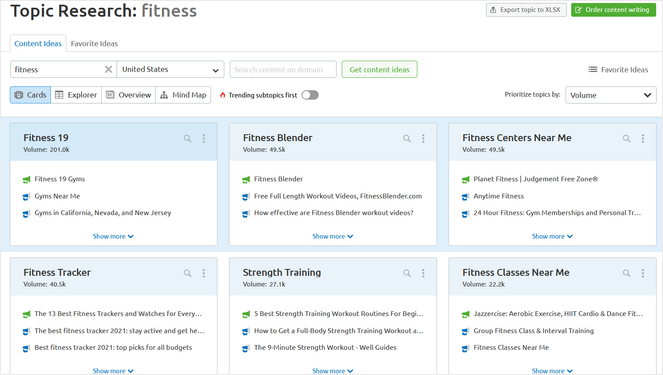
You can click on each card to view more helpful information like the best-performing articles for that topic, headline ideas , “People also ask” questions, and related searches.
Using the Keyword Magic Tool, you can also figure out what keywords people are searching for related to your topic.
Here, we entered the topic “best cardio workout” into the Keyword Magic Tool:
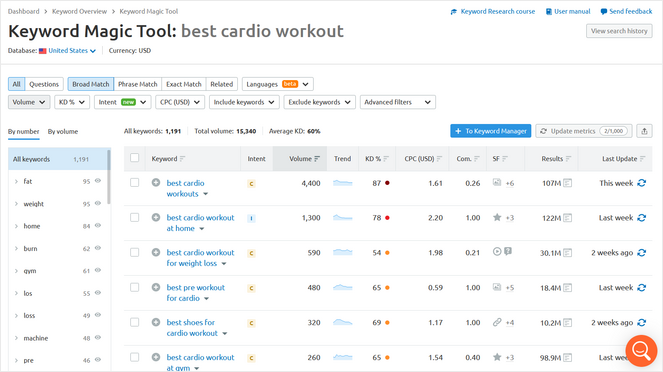
We got a list of relevant terms that people are searching the web for, along with the volume, keyword difficulty, and other important data.
2. WPBeginner Keyword Generator Tool (Free)
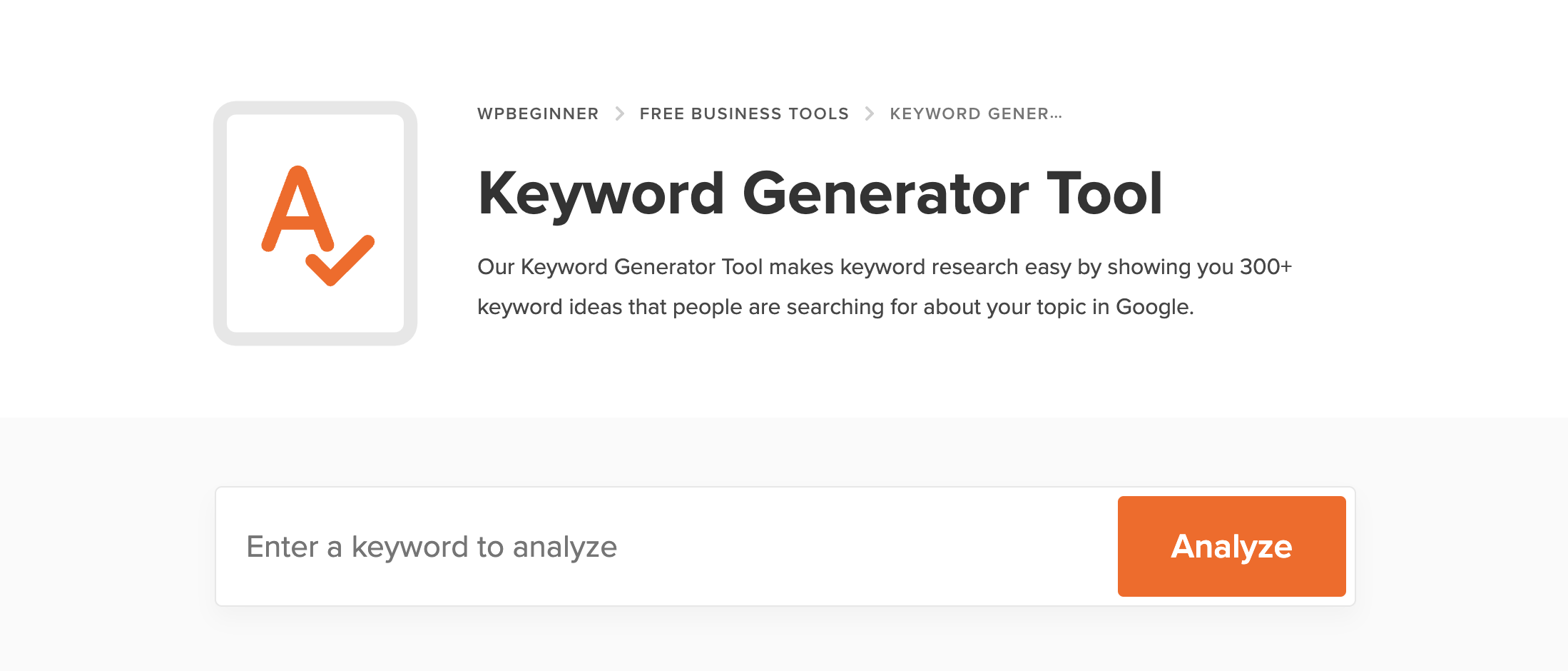
WPBeginner Keyword Generator is a completely free tool that lets you easily discover new keywords and topic ideas for your blog.
All you need to do is enter your main topic keyword into the tool and hit the ‘Analyze’ button. Then, the tool will generate 300+ new keyword ideas that people are searching for in Google, related to your topic.

You can browse the list of keyword ideas, which are organized into 3 sections:
- Alphabet – Alphabetical list of related keywords that people search for in Google.
- Prepositions – Related keywords that include prepositions like can, near, is, to, etc.
- Questions – Related long tail keywords in the form of questions.
You can also download the list of keywords as a CSV file to use in a spreadsheet software like Google Sheets or Microsoft Excel.
The best part is that you don’t need to create an account to use the WPBeginner Keyword Generator and there are no daily limits
WPBeginner also offers other free tools, including a Blog Idea Generator , Keyword Density Checker , Website SEO Analyzer , and more.
3. Ahrefs (Paid)

Ahrefs is another premium, popular SEO tool that lets you track and optimize your search engine rankings. It has features like a site explorer, keyword explorer, blog auditor, and more.
There’s also a Content Explorer feature that will help you generate new topic ideas quickly. Simply enter a topic idea into the search field, and the Content Explorer will find and analyze the top-performing blog content related to your topic.

You can sort the results by organic traffic, referring domains, domain rating, social shares, and traffic value.
With each result, you can also dive into more details like the word count, backlinks , and organic keywords. All of these insights will help you improve your blogging strategy and general content creation process to beat your competitors.
4. AnswerThePublic (Limited Free)

AnswerThePublic is a keyword tool that will give you content ideas in the form of questions.
Enter a topic you want to search for, and this tool will display search questions and suggested autocomplete searches in the form of a visual cloud, like in the example below.

Aside from questions, you can also view results for prepositions, comparisons, alphabeticals, and related searches.
When it’s challenging to come up with fresh blog topic ideas , knowing the questions and keywords your readers search in Google can be a goldmine of information. Not only does it allow you to get to know your audience better, but it also helps you find blog topics you can use to answer their questions and provide solutions to their problems.
5. BuzzSumo (Limited Free)

BuzzSumo offers a Content Analyzer tool that will show you what content related to your topic is getting the most shares on social media platforms like Facebook, Twitter, Pinterest, and more.
This is useful because when you learn which blog posts in your niche are the most popular topics for readers, it will help you come up with ideas that are also likely to perform well on social media .
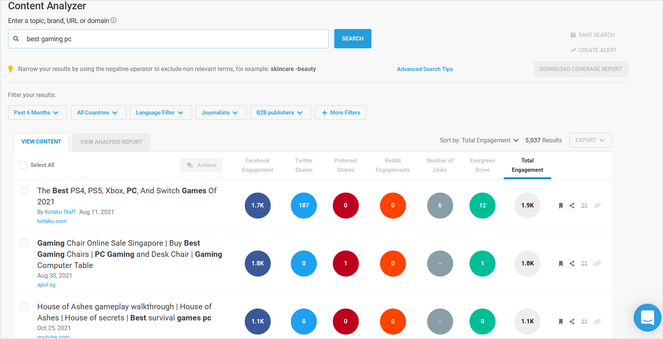
You can filter the results by a certain time period, such as the past 6 months, quarter, month, week, and 24 hours.
And if you have a YouTube channel , BuzzSumo also has a YouTube Content Analyzer that will pull the top videos related to your topic so you can study the competition and get new ideas.
6. Keyword Tool (Limited Free)

Keyword Tool is a free keyword planner that helps you find relevant keywords and topic ideas to use for your blog.
This tool uses Google Autocomplete to generate up to 750 long-tail keywords for every search term, so you have plenty of content ideas to sift through without paying a dime. You don’t need to create an account to use this tool, either. As soon as you start typing keywords, it will display relevant suggestions.
Aside from Google, you can also search for keywords from Bing, YouTube, Amazon, eBay, Instagram , and more.
But you aren’t able to see important data like search volume. For that, you would have to upgrade to a paid plan.
7. Ubersuggest (Limited Free)
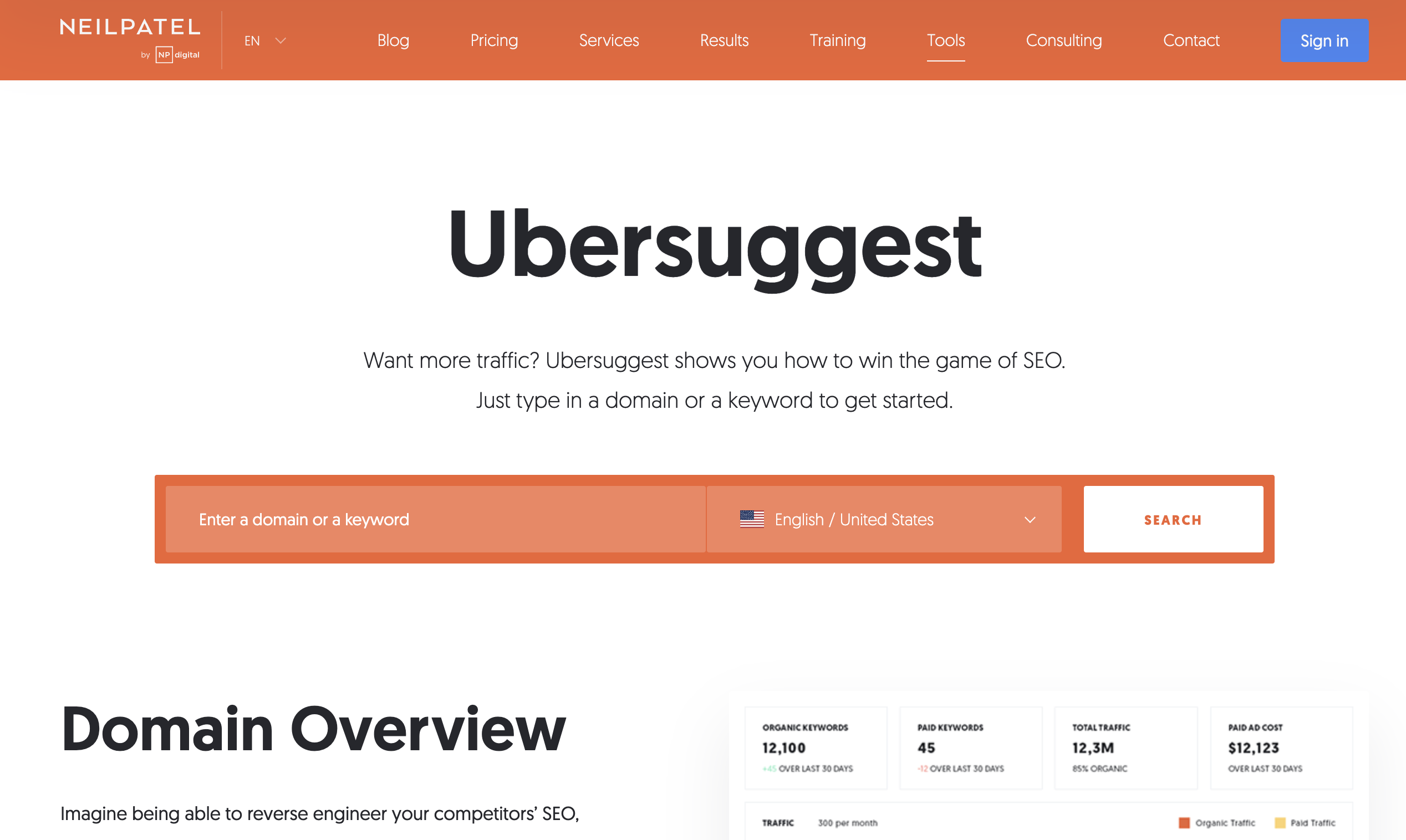
Ubersuggest is another free keyword research tool that allows you to look up different keywords and spy on your competitors.
When you enter your keyword, Ubersuggest will display a list of ideas related to it. You can see the volume, trend, SEO difficulty, and more, for each keyword.
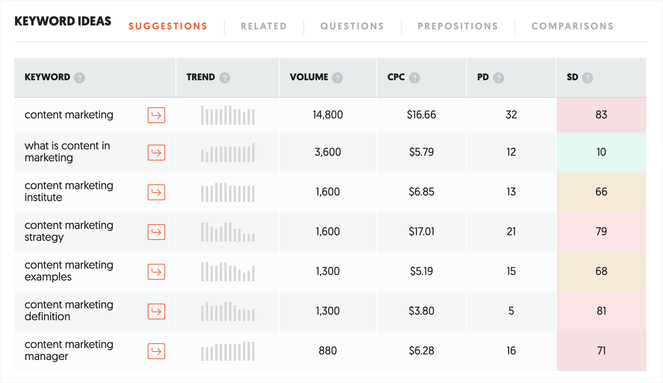
You can view the Google Search Results for each keyword as well, which will show you which websites and articles are ranking in the first 10 positions.
It also has a Content Ideas section that displays content from across the web with high social media shares. You can use these articles and headlines for inspiration.
With Ubersuggest, you only get 3 free searches a day. For more searches and features, you’ll need to upgrade to a premium plan.
8. Google Trends (Free)

Google Trends is a free data exploration tool that analyzes the popularity of search queries in Google. It tells you what search terms are popular across various regions, languages, and time periods so you know what’s trending in your industry.
You can even compare different search terms to see which topic is more popular:
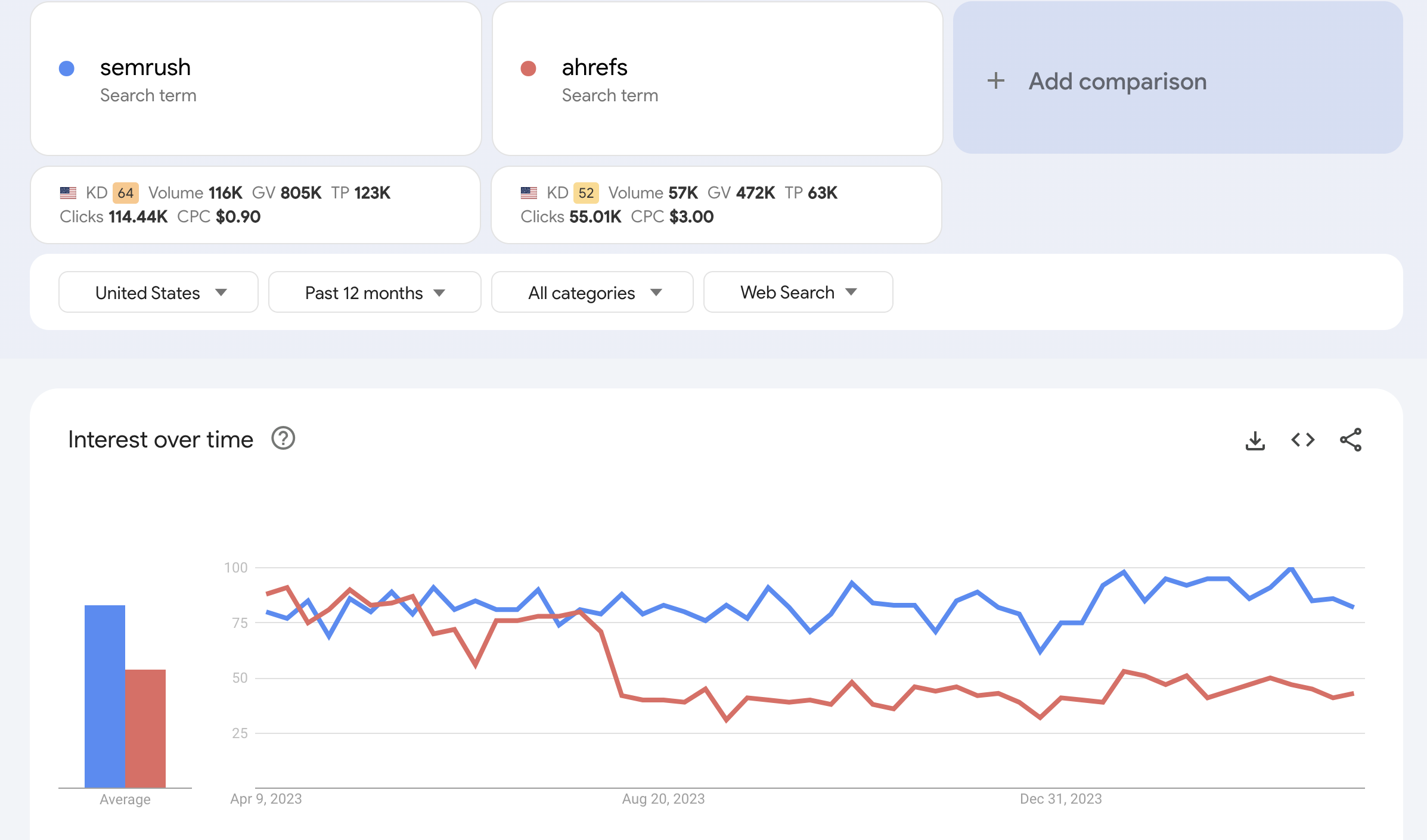
This tool is a great way to gain insight into what people are searching for and what trends they’re interested in at the moment. Then, you can apply these trends to your content marketing strategy and create blog posts that are relevant and timely.
Along with keyword trends, you can also view the trends for images , videos, stories, and even Google shopping.
If you like to write about current or seasonal topics that are time-sensitive in nature, then Google Trends is a great option for you.
9. Quora (Free)

Quora is a popular question-and-answer platform where users can ask anything they want and receive answers from other users.
Because it’s full of questions, it’s a great method for generating helpful topics for your blog. You can see questions asked by your target audience, so you know what they’re curious about and what they need help with.
For example, if you run a blog that’s all about WordPress , you can find out what WordPress beginners are struggling with and create blog posts to answer their questions.
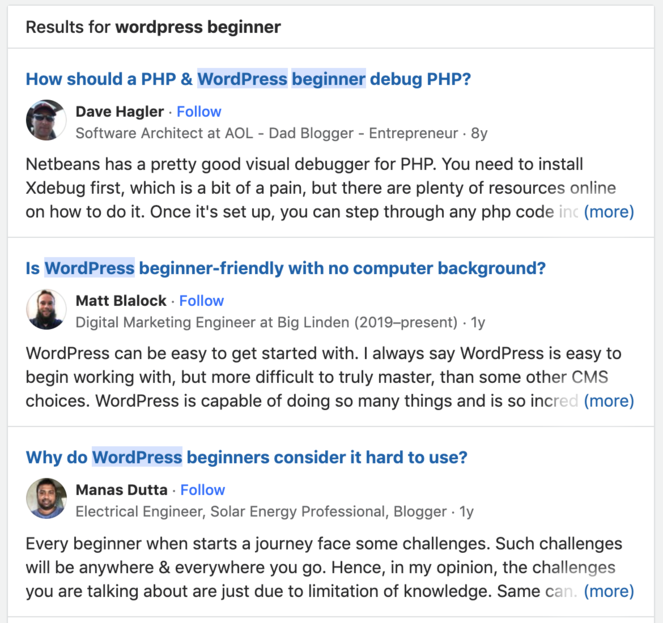
Plus, by setting up a Quora profile and answering users’ questions, you can establish yourself as an authority in your industry. And if you optimize your bio and profile, you can promote your blog and drive more traffic to your site.
Bonus: HubSpot Blog Idea Generator (Limited Free)

HubSpot Blog Idea Generator is a free topic idea generator that instantly produces ideas when you enter a keyword or keywords.
You can add up to 5 nouns in the search field. You’ll then receive a week’s worth of potential blog post ideas (5 ideas) with headlines chosen by the platform that are likely to perform well in search. It’s pretty basic but it’s enough to get your creative juices flowing.
If you want to get a year’s worth of blog post ideas from the HubSpot Blog Idea Generator, then you’ll need to create an account.
Bonus: MonsterInsights (Free + Paid)
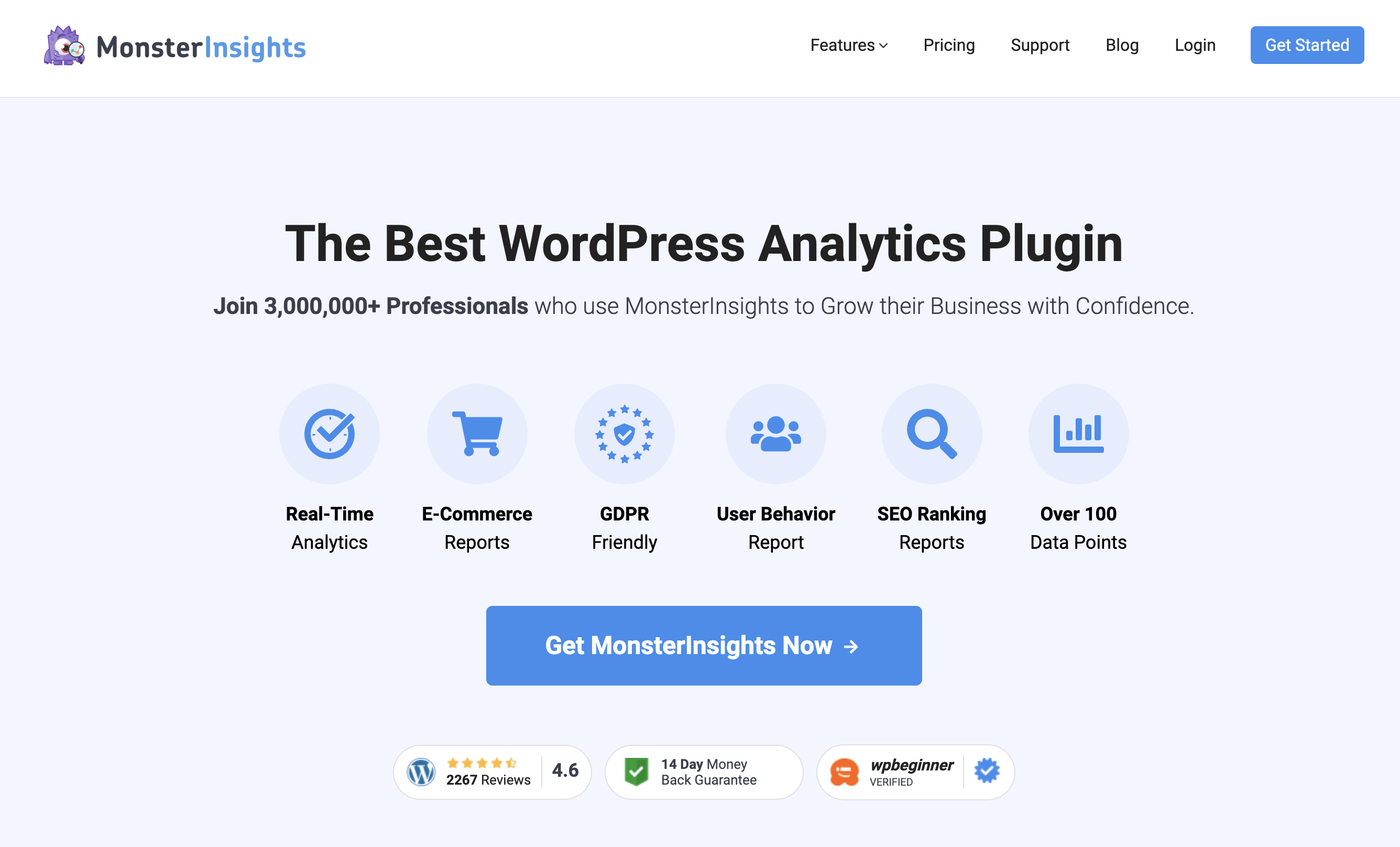
MonsterInsights is the best Google Analytics plugin for WordPress. It’s trusted by 3,000,000+ professionals to monitor their website’s performance and collect valuable insights to grow their business. The best part about this plugin is that you can view these important analytics right from your WordPress dashboard.
So, how does MonsterInsights help you come up with blog topic ideas that will convert?
With this plugin, you can see what content on your blog already performs well so you can continue creating similar, relevant topics you know will resonate with your readers.

For example, if one of your top-performing posts is a tutorial on how to start a photography blog , you can expand on that topic by coming up with subtopics related to it. Since your readers loved the original post, they’re likely to enjoy your new posts on the subject too.
MonsterInsights also gives you a ton of other valuable information that will help you learn more about your website visitors and what they’re looking for so you can keep them coming back.
You can view metrics like what outbound links get the most clicks, what keywords users searched for, the top-performing affiliate links, and much more.
When researching topic ideas for your blog, it’s essential to know what’s currently performing well on your website and what isn’t so that you can make the necessary changes and continue to improve your blogging strategy .
Note: You can get started with the free version of MonsterInsights . For more advanced features, you can upgrade to the Pro version .
Why Should You Research Topics for Your Blog?
In case you need a friendly reminder, here are some of the keys to keep in mind as you research topics, and why the process is so important.
- Attract the Right Audience. If you write general topics that appeal to anyone and everyone, you’ll fail to build a solid, niche audience that keeps coming back. Researching topics allows you to create content that resonates with your readers and helps them trust your brand for solutions and information.
- Learn What Your Readers Want. Keyword research and blog topic research tools allow you to see what keywords, phrases, and questions your audience types into search engines. This helps you create relevant content that your readers are already interested in, which will help you drive more targeted traffic to your blog and boost conversions.
- Improve SEO. You have a higher chance of ranking in search engines if you use the right keywords and phrases in your content. Most blog topic research tools will help you find the keywords that can help your blog reach the first page of Google and other search engines.
Now that we know the main benefits of researching blog topics, let’s dive into the tools that will make this process easier.
Instead of having to search the internet far and wide to figure out topic ideas that will convert, you can use these blog topic research tools to get instant ideas.
Best Blog Topic Research Tools in Closing
That’s a wrap!
We hope these blog topic research tools will help you discover a ton of new content ideas that perform well with your readers.
Feel free to also check out our guide on how to write a blog post . It’s packed with expert tips on how to write a blog post that converts.
And while you’re here, sign up for our email newsletter so you can get helpful content like this sent right to your inbox!
You might also like...
See all similar articles in this category...
Add a Comment Cancel reply
We're glad you have chosen to leave a comment. Please keep in mind that all comments are moderated according to our privacy policy , and all links are nofollow. Do NOT use keywords in the name field. Let's have a personal and meaningful conversation.
Save my name, email, and website in this browser for the next time I comment.
This site uses Akismet to reduce spam. Learn how your comment data is processed .
i like that quora .it is a popular question and answers basement where users are asking any question they want receive from another users . thanks for sharing this post.
very Informatic blog keep posting
Thank you for great content. I will also share with my friends.

Join our 30,000+ email subscribers for blog updates and get instant access to a 10,000-word guide on how to start a blog and build a sustainable business using keyword research, Google traffic, and a lot of tested strategies. Let us help you build a blog to support your family's income and help the community while you're at it!
How to Find Blog Topic Ideas (With Tools and Examples)

There are a lot of blogs out there dedicated to the art of blogging, and many of them write helpful guides on how to perform various tasks - tasks such as, for example, topic ideation. When you search for this topic, what do you find?
Tools. Lists of software, all of which are designed to generate topic ideas for you. Click a button, type in a search term, get a list of new blog ideas hundreds or thousands deep.
The trouble is, most of these work the same way. They plug that keyword into Google with variations and add letters to trigger different autocomplete queries, use the Google keyword planner to find ad keywords, or take an existing list of topic templates and shoehorn the keyword into them.

In my experience, 50% or more of the topic ideas they give you are nonsense. You'll get things like "Top Ten Ways Content Marketing Can Help You Learn to Fish" or something. I mean, sure, maybe you could spin that into a relevant idea somehow, but it's not likely to be a top-tier traffic generator.
Blindly using tools tends to produce sub-par results. That's why I decided to write this post: to give you an idea of my process and maybe a couple of tools I use to facilitate it.
The key here is the process , not just a list of tools to use.
Let's get started.
Step 1: Generate Blog Post Ideas
The first part of the process is to generate as many basic blog post ideas as possible. This step is where all those tools come in. By developing a massive list of possible topics, you can review each one and pick winners of the bunch.
That's what the majority of this post will be about, but without some primary data to start with, you have nowhere to begin.
If you want to generate ideas manually, I recommend looking into communities where your audience is talking. Reddit subs, Quora, Facebook Groups , LinkedIn Groups, Twitter; these are all places where conversations happen. Those conversations are about something, which means there's an unfilled niche for information.

If you choose to use tools, you have plenty of options, of course.
- Ahrefs (my favorite)
- Google Search
- Google Autocomplete
- Google Trends
- Ubersuggest
- Answer The Public
- Tweets and hashtags
- Influencers
At least for this first step, the point with these tools is to list as many potential topic ideas as possible. As you'll see later, filtering them is a large part of the topic ideation project.
Step 2: Evaluate Blog Topics
This step is where the bulk of your work will be.
First, go through your blog topic list and remove anything that's nonsense or too generic to be helpful. Suppose you put in "content marketing" and get a "guide to content marketing" well, yeah. That's an obvious keyword, and it's far too generic for virtually anyone to rank producing content for it, so you can safely remove it from the list.
Next, it's time to do some research and see what the environment around your blog topic idea looks like.
1. Check on traffic.
You can find organic traffic estimates using tools like Ahrefs and Semrush. These metrics will show you the content that already exists for the topic and estimate the monthly traffic those pieces of blog content can realistically attract.
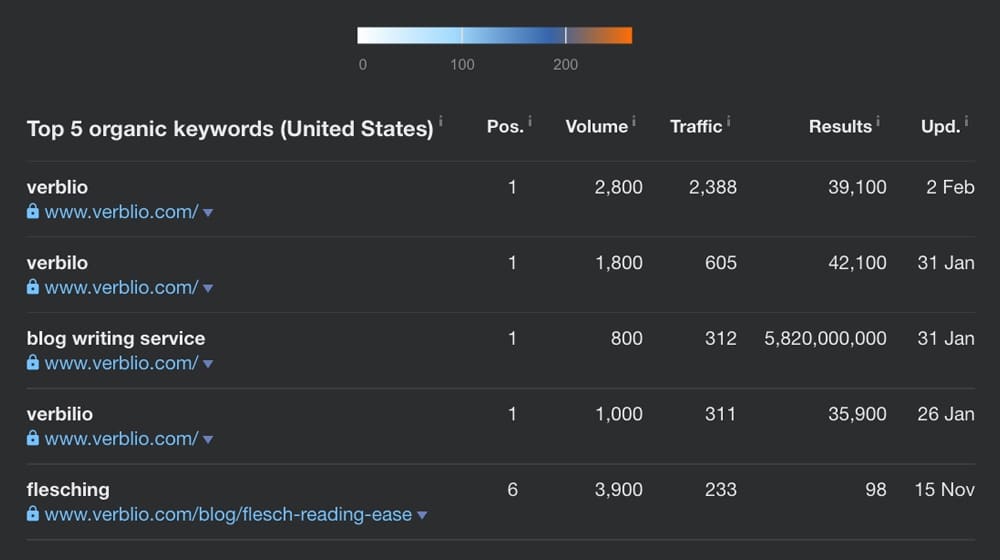
Traffic estimates can also show you which topics are nice-looking but get poor search volume and which ones might look mediocre but have a lot of traffic behind them. You can also identify key topics that pull in most of the traffic for a competitor.
2. Check for competition.
Using the same tools and simple Google and search engine searches, and other relevant digital marketing tools, you can estimate competition for the keyword and topic.
- How long are the other pieces of content covering the same topic? Will you be able to outdo them, or will it be a struggle? Are they producing quality content, or is it mostly fluffy?
- How old is the other content out there? Older content tends to be more entrenched and harder to supplant, primarily because of accumulated backlinks, but it might also be out of date, which is an opportunity for you.
- What kind of engagement does it have? Does it have a lot of social media shares? Does it have many blog comments, and are they good or spammy?
- How optimized is it? Does it have blog images , and do they have good alt text? Does it use keywords appropriately? Is it formatted nicely?
- Is it a popular topic? Are you the first person to write about this? Are there dozens of similar articles or hundreds?
All of this aims to give you an overall impression of the content to answer a single question: can you compete and rank for the keyword, or is it a fool's errand to try?

Remember that sometimes it can be worth producing new content to have something published for a popular keyword, even if you don't rank, because not covering the blog topic seems like a strange gap.
We create blog content that converts - not just for ourselves, but for our clients, too.
We pick blog topics like hedge funds pick stocks. Then, we create articles that are 10x better to earn the top spot.
Content marketing has two ingredients - content and marketing. We've earned our black belts in both.
3. Check for demand.
Some topics have existing demand for a particular kind of content. For example, a keyword directly relates to a customer's pain point is begging for a solution. The people searching for that topic have a specific idea in mind of what they want to find, and if you can provide it to them, you immediately reap the benefits.
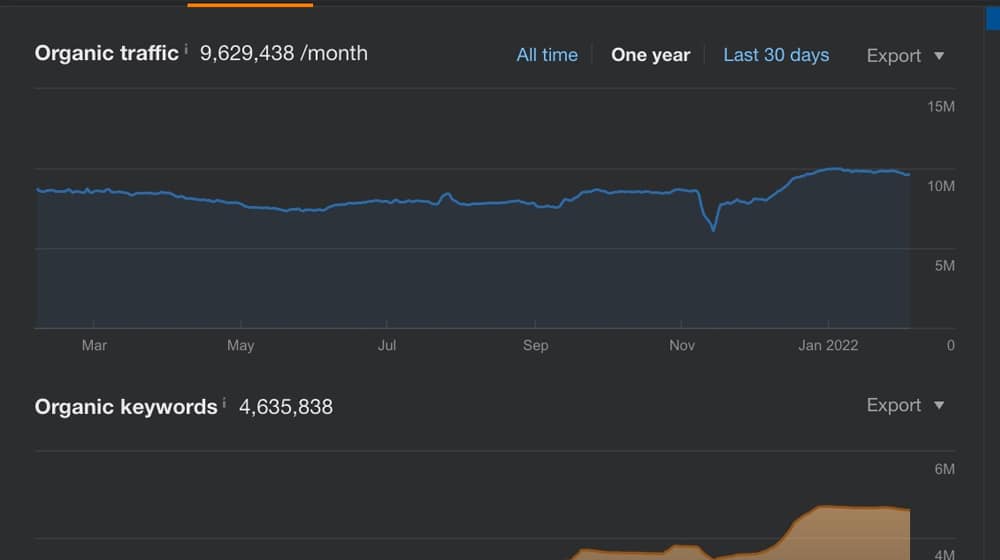
This process is valuable if you find demand relevant to your business product or service. The best-case scenario is one where you can directly address a pain point, give DIY instructions for solving it, and include a call to action to let people skip the hassle by paying for your product.
Step 3: Develop Angles
Once you have a new topic you think might be a winner, it's time to figure out what you want to write. After all, there's more to it than just picking a keyword and handing it over to a writer.
Generally, there are three major decisions you need to make, each of which has a defined impact on the blog content you produce.
1. Determine the buyer persona.
The first is to figure out who your audience is. Different audience attributes will affect the way you produce content.

Consider factors like:
- Are you aiming more towards men or women? Younger or older? This approach can affect your writing style, the kinds of references you make, and even what other sites you choose to link to.
- Experience level. Are you writing a beginner's guide for novices or an advanced guide for experts? You don't want to be explaining how the internet works to an audience of IT professionals.
- Is this B2B or B2C? Talking about consumer-grade options isn't going to help if your audience is primarily business-class. Conversely, recommending a business-level service to solve a problem doesn't support an individual looking for assistance in their living room.
- Expected budget. The customer's budget is similar to the context problem. If you're talking to people with consumer or small business budgets, recommending enterprise software or service won't do well. Conversely, a business with a big budget most likely won't want to cobble something together out of free tools and DIY solutions.
All of this combines to help you figure out a target audience for your post. Some of it will be determined by your business and service (for example, if you're B2B or B2C), while others can change from post to post. In some cases, you can even take the same topic and write 2-3 posts from different perspectives and with different goals.
2. Determine the keyword intent.
This one goes hand in hand with the buyer persona. Some keywords have a specific buyer intent behind them. Others might be generic enough that you can leverage several different buyer intents, either into the same post or into various posts with keyword variations. User intent is so important I wrote a whole post about it here . To summarize, there are several kinds of search intent, all stemming from why a user is searching for a keyword.

- A keyword like "Netflix" is likely a user intending to go to Netflix.com, not necessarily learn about Netflix from other venues. These are often not valuable keywords to target.
- The user wants to learn something about their keyword, so they want to find an authoritative, trustworthy source that wrote about it. There's no further intent but to satisfy curiosity or learn more about a topic, but you can sometimes leverage it into a more profound interest.
- The user wants instructions on how to complete a task. These are great because it's usually a customer pain point, making it an excellent choice to target.
- Commercial and Transactional. These are the people actively out looking to buy something, or at the very least do research into a product with buyer intent. These are the best to capture people who might be interested in buying your stuff.
You can see how (combined with the previous item) you can take one keyword and spin it off into many different pieces of content. Generally, those pieces of content are residing at various places in the sales funnel , too. One post focusing on informational queries pulls in many broadly interested people. A second one pulls in part of that audience more focused on learning deeper information about the topic, and a third convinces them to buy your relevant product.
3. Determine the content type.
Your choice partially informs the third consideration you make of the first two items, but it is somewhat independent. That is, the type of content you produce. Is it an informative post? A listicle ? Linkbait? Evergreen content?

I produced a rundown of the various types of content over here . Among these, a few stand out as the most important types of content: evergreen informational content, link bait, list format content, and skyscraper content.
In broad strokes, whenever you're reaching top-of-funnel readers with low purchase intent, you're going to want to aim more informational in your format with more evergreen styles of blog content . Linkbait, list posts, and skyscraper content all work well here.
Then, you can do more evergreen and link bait formats with tutorials and deeper informational content for mid-funnel people who are performing in-depth research. Your goal is to hook readers and convince them you know what you're talking about beyond the surface level.
For the people at the bottom of the funnel, the ones most likely to be converting, your new content shifts more transactional and commercial. You're directly addressing pain points, often more narrowly than your top of funnel topics, and you lace the content more heavily with purchase CTAs.
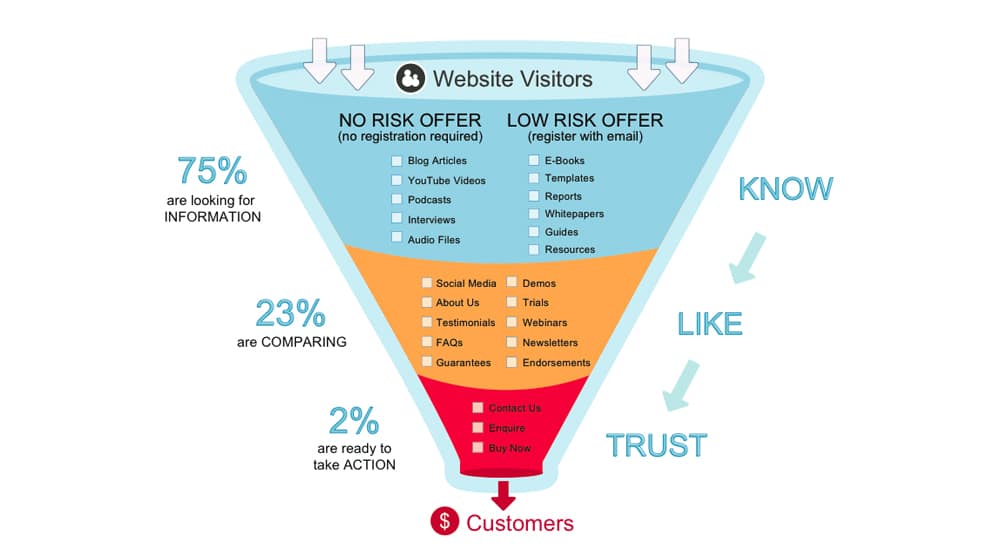
Again, all of this stems from a single keyword and topic. One keyword, generated by one of those tools listed up top, can spin off into half a dozen or more pieces of distinct, non-cannibalistic content on your site.
Of course, this is all the groundwork. Once you've nailed down your audience, your intent, and your keyword, that's where the real fun begins. It's time to add that topic to your editorial calendar and produce a great article that takes all of those factors into account.
What Do You Do?
My favorite way to brainstorm new blog post ideas is by searching Google, looking at what's working for competitors, customer pain points, and Google autocomplete. I then pass over it manually to pick out the most promising topics and research them using Ahrefs, which is by far my current favorite keyword research tool on the market. I do my initial research with an SEO tool like Ahrefs, then make my persona/content/format decisions, and use all of that information to develop a title, which I then either write myself or (in the case of my clients) give that topic to my writers to produce. The result is excellent content, well-targeted to an available audience, and engineered to convert.
I'm curious what other business bloggers have to say. What do you do to generate content ideas for your site? What are your favorite tools? Is there a step in your content strategy that I don't use but maybe should? Let me know all about it in the comments.
James Parsons is the founder and CEO of Content Powered, a premier content marketing agency that leverages nearly two decades of his experience in content marketing to drive business growth. Renowned for founding and scaling multi-million dollar eCommerce businesses through strategic content marketing, James has become a trusted voice in the industry, sharing his insights in Search Engine Watch, Search Engine Journal, Forbes, Entrepreneur, Inc, and other leading publications. His background encompasses key roles across various agencies, contributing to the content strategies of major brands like eBay and Expedia. James's expertise spans SEO, conversion rate optimization, and effective content strategies, making him a pivotal figure in the industry.
Join Thousands of Marketers and Get Free Tips Weekly!

Related Posts

[Guide] 12 Ways to Choose the Right Keywords for SEO

SEO: How to Estimate Search Volume Metrics for Blog Topics

Evergreen Blog Posts: Content Ideas, Examples, and Tips
March 17, 2022 at 9:22 pm
It's been difficult for me to think of topics to write about recently so this is a great help. Thanks.
March 25, 2022 at 1:57 pm
Thanks Amar! Love to hear it.
April 18, 2022 at 9:02 pm
This is a big help! Thanks a lot.
April 29, 2022 at 1:28 pm
Thanks Aimee! Love to hear it.
July 21, 2022 at 9:19 pm
I very much needed this. I just sometimes feel like I've run out of ideas.
July 22, 2022 at 4:14 pm
Hey Ned! Happy to help out.
Some weeks are better than others; you'll find a treasure trove of topics, and then you'll go weeks without finding any good ones.
Building a content calendar and planning in advance saves so much time.
Leave a Reply Cancel reply
Name (required)
Email (will not be published) (required)
Your Comment
Let's Grow Your Business
Want some free consulting? Let’s hop on a call and talk about what we can do to help.
Showing 1 - 10 out of 832 for:
11 amazing tools for generating blog topic ideas.
Getting inspiration for your blog can be challenging, but if you keep your audience and your business market in mind, you’ll find the right topic to write about.
Discover fresh SEO blog topics and ideas with these eleven (11) amazing tools. Boost your SEO efforts and stand out by finding inspiration with these topic research tools that will resonate with your audience.
Say 👋 To Your New Favorite SEO Tool
Don’t let a complicated interface slow you down. Find opportunities faster with SEO.com!
How to find blog topics
Finding SEO blog topics can be challenging, but if you keep your business goals and audience in mind and find inspiration from topic research tools, this type of content can help your company reach its target audience.
Before listing our recommendation on how to find blog post ideas, consider the business market, purpose of the post, relevant keywords, and value for the audience.
Let’s explore how to find blog post ideas in greater depth.
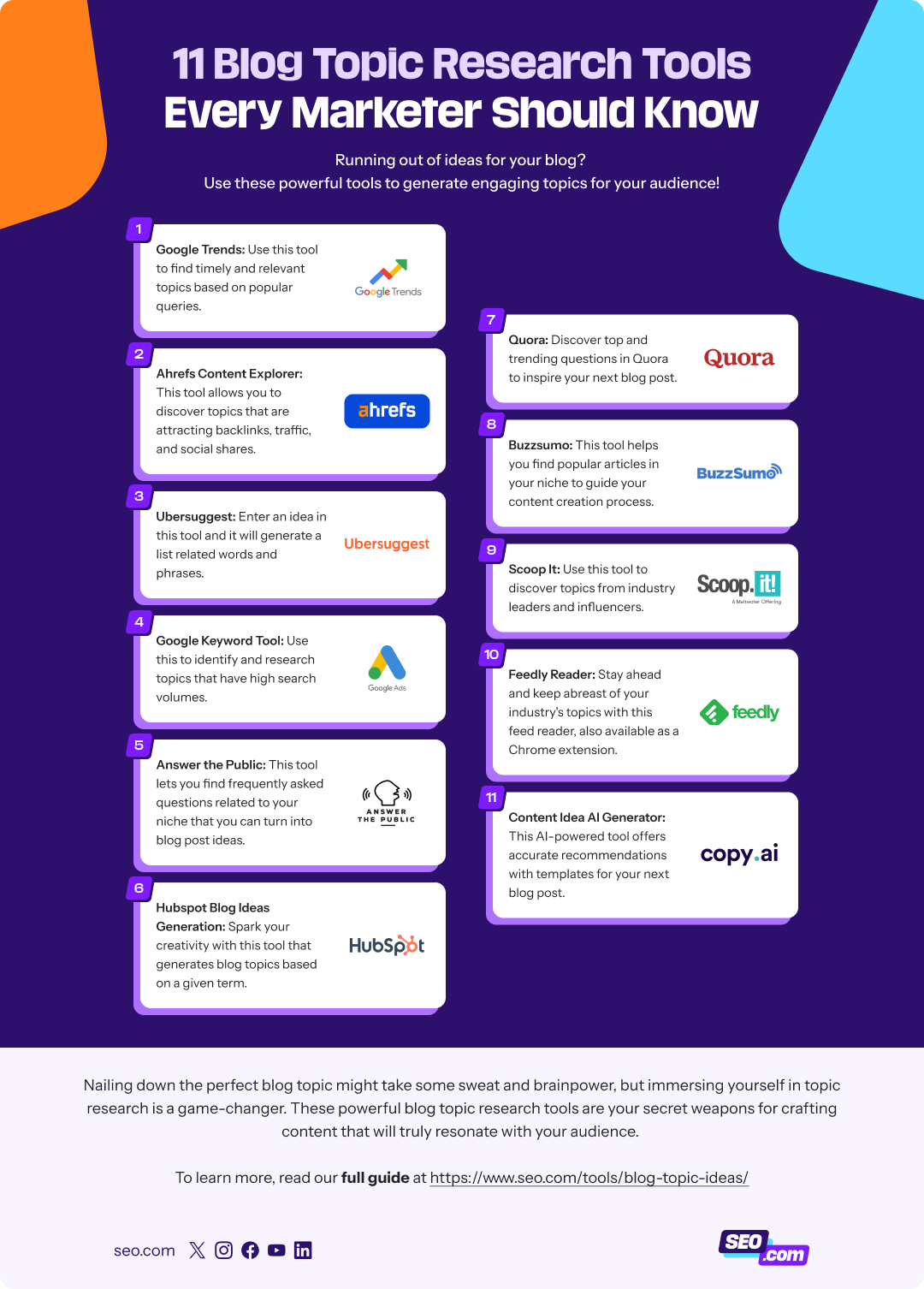
1. Google Trends
Google Trends is one of the most relevant SEO blog topics tools to get some inspiration, and it also helps you discover popular topics and queries, giving you insights into your audience’s interests. Using it can lead to timely and relevant blog topics that attract your audience.

Besides finding content topics, it’s a fantastic market research tool .
2. Ahrefs Content explorer
Ahrefs content can help you find popular SEO blog topics in your niche. Use its Content Explorer to analyze backlinks and social shares, pinpoint issues that resonate with your audience, and attract authoritative links.

To discover pages with impressive traffic despite having few backlinks, try refining your search results by filtering them based on referring domains and estimated monthly search traffic. You can also identify SEO blog topics (or even infographics ) that are easier to rank for without having to create an extensive number of links.
3. Ubersuggest
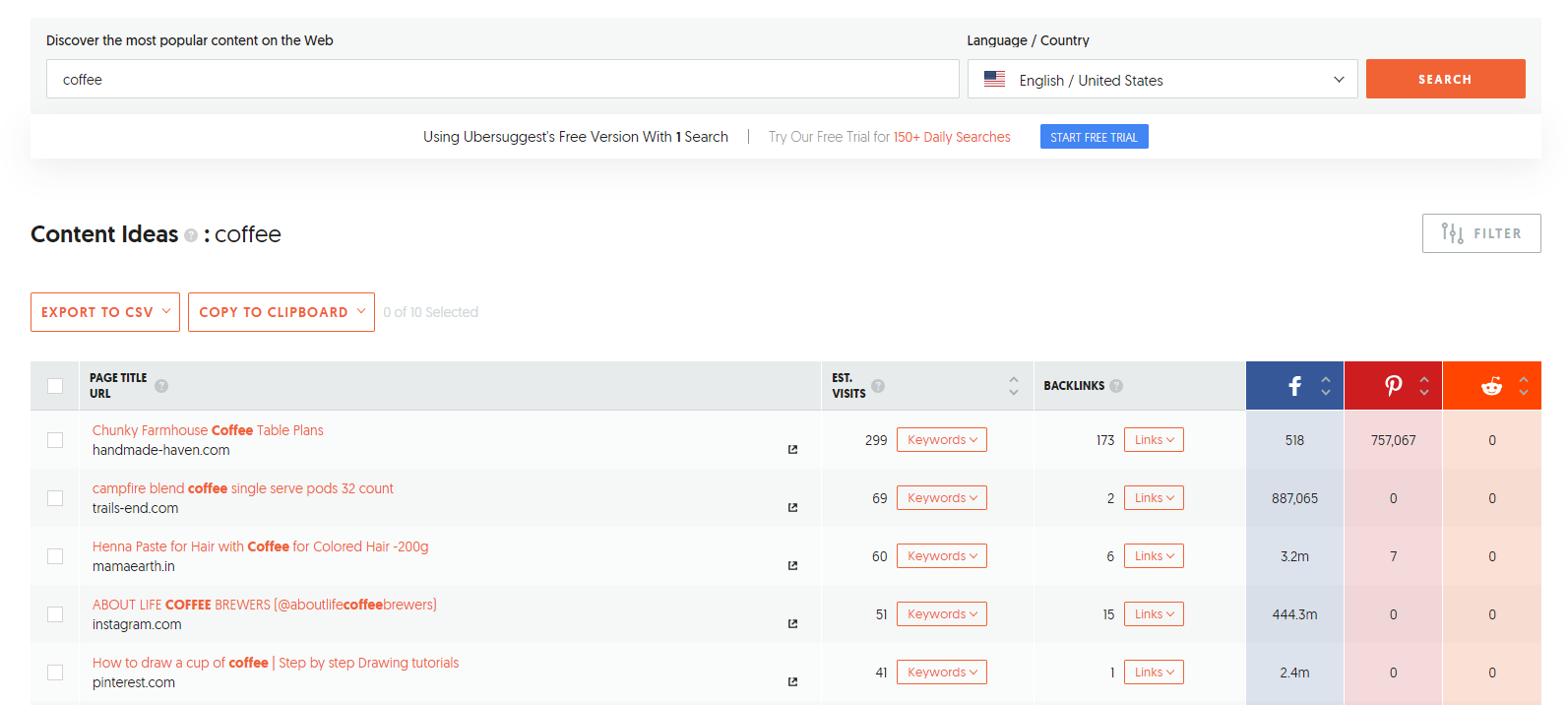
Although Ubersuggest is not ideal for SEO blog topic ideas, it is an excellent tool for generating new SEO blog topic ideas. How to find blog posts ideas? Easy, enter a word or phrase, and it will produce a long list of related results grouped from A-Z.
4. Google Keyword Tool
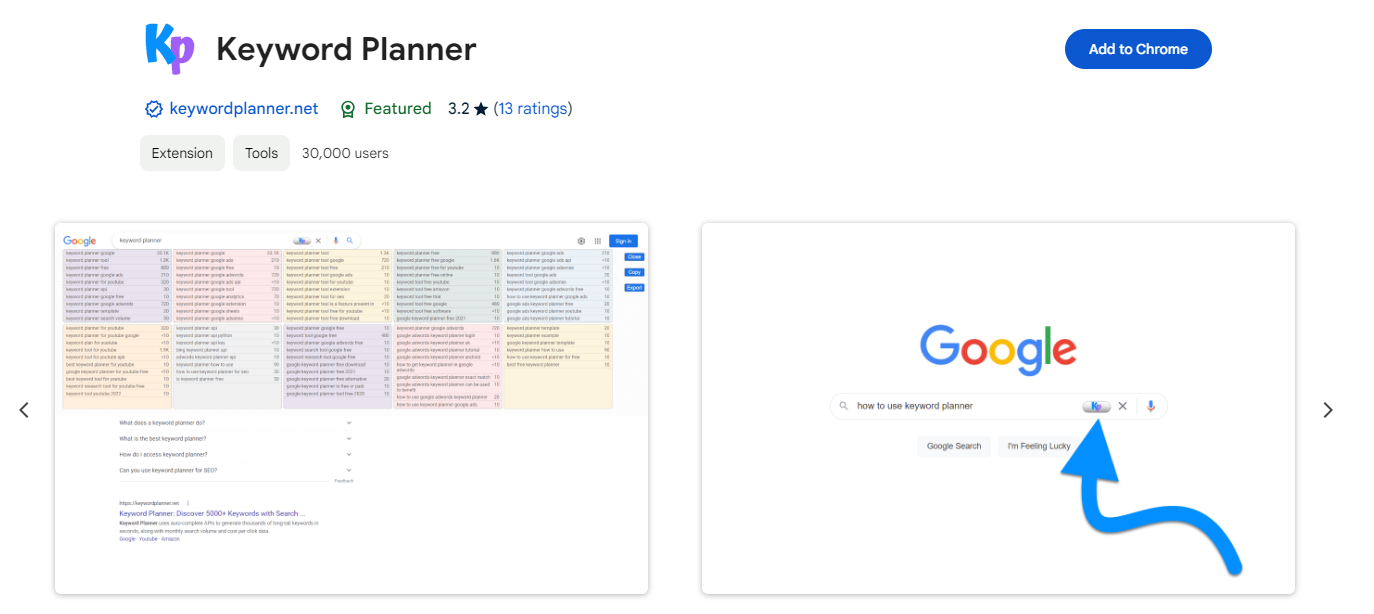
Another good SEO blog topic tool is the one from Google Keyword Tool, which is practical not only to get some inspiration to generate general blog topics but also to help identify and research keywords with high monthly search volume.
5. Answer the Public

Answer the Public helps generate SEO blog topics by revealing common user questions about a chosen subject, making it an essential tool for understanding user intent.
6. Hubspot Blog Ideas Generation

HubSpot’s Blog Ideas Generator is a good blog topic tool to spark your creativity. It generates potential SEO blog topics by entering relevant terms. Some ideas may require tweaking, but this tool will kick-start your brainstorming process.
7. Quora
Quora is all about getting some answers, so this is an excellent place to get some SEO blog topic ideas to inspire content. If there’s anything you can learn from Quora, by answering your visitor’s questions, you will ensure traffic and will engage your audience.

Quora is a good place for discovering those questions. Enter a word or phrase related to your topic and see what questions users ask. Once your results are displayed, you can click on “Top Stories,” “Trending,” and “Questions” to dive deeper into your topic.
8. Buzzsumo

While searching for SEO blog topics, BuzzSumo helps you find popular articles in your niche to guide your content creation as a source of inspiration.
9. Scoop it

Scoop is one of the best SEO blog topics tools if you want to find interesting content. You can research and discover curated content on various topics, including industry leaders’ perspectives and opinions. Additionally, it allows for easy content curation and sharing on social media or blogs.
10. Feedly Reader

This SEO blog topic ideas gets your inspiration and ideas feed up and running. Plus, it’s available as a Chrome extension for digital marketers .
11. Content Idea AI Generator
Yes, it’s AI time. And this SEO blog topics AI generator is handy because includes templates according to your blog post needs and offers accurate recommendations on how to organize your post.

Streamline your content and SEO strategy with the SEO.com app
Now you have broad SEO blog topic resources and answered the question “how to find blog posts ideas,” get ready to take your blog to the next level with the free SEO.com app.
Start researching blog topic ideas with the SEO.com app’s hassle-free keyword research features by trying it for free today!
Table of Contents
- How to Find Blog Topics
- Streamline Your Content and SEO Strategy with the SEO.com App

👋 Meet Your New Favorite SEO Tool
built for effortless SEO

Related Resources
10 best competitor analysis tools to track your competition in 2024.
- 10 Moz Alternatives That Will Help You Nail Your SEO
- 10 Top PPC Tools for Management, Analysis, and More
- 11 Best Ahrefs Alternatives: What Redditors, Reviews, and Our Team Say
- 11 Semrush Alternatives According to Reddit, Reviews, and Our Team
- 12 Best On-Page SEO Tools in 2024 (Free and Paid)
- 12 Ubersuggest Alternatives to Consider for 2024
- 18 Best SEO Analytics Tools to Use in 2024
- 18 of the Best Site Speed Tools to Test Your Website
- 7 Best Target Audience Tools for Finding Your Market in 2024
7 Best AI SEO Tools (And How to Use AI for SEO in 2024)

Explore the future of SEO with the top AI SEO tools, including Surfer SEO, Ahrefs, Jasper, Semrush, Outranking, Alli AI, and ChatGPT, complete with pricing, use cases, and expert tips.

Competitor analysis tools like SEO Checker, SimilarWeb, SEMrush, and MarketingCloudFX are essential for understanding competitors’ strategies, informing business plans, and more. Keep reading to learn more about these tools!
How To Use Google Trends for SEO To Drive Site Traffic
Google Trends is invaluable for SEO, offering insights into trending keywords, seasonal searches, local SEO, and competitors. Learn how to use it to enhance your SEO.
7 Top Keyword Research Tools for SEO in 2024
Explore the top keyword research tools for SEO, including Semrush, Ahrefs, Google Trends, and more, complete with costs, pros, cons, FAQs, and expert tips from the SEO.com team.
- Skip to main content
Additional menu

Valchanova.me
Digital strategy, content, growth, and measurement

Topic Research: The Tools and Process You Need to Generate Content Ideas
11 min read Filed Under: Content Marketing
It’s that time of the week again. The moment every content marketer dreads.
You sit in front of your computer and a blank page stares back at you.
The title reads “Content Topics for the Coming Week”.
You stand there, brain completely frozen, desperately trying to think of something you haven’t recently said. A fresh new topic – that elusive beast…
It doesn’t need to be this way. In fact, topic research can be an easy structured process that leaves you inspired and motivated rather than tired and deflated.
Today, I want to share some of my go-to tools that make topic research a breeze.
Topic research vs. keyword research – what’s the difference?
Some marketers conflate keyword research and topic research. However, there are substantial differences.
Keyword research is done by SEO experts. It tries to understand the specific phrases people use when discussing a given topic. The end goal is to rank for those keywords that are related to the brand or that will expose new qualified users to the brand.
Topic research is done by content marketers. It tries to understand what topics our target audience is interested in . It doesn’t study the specific phrases as much as it tries to combine them into relevant topics. The end goal is to inform the content plan so that the brand creates content of value to its target.
How to do topic research?
This will be a very short guy as there isn’t much to talk about in terms of process. What you need to do is:
- Get a notebook at the ready or open a file on your computer.
- Fire up your go-to topic research tools.
- Insert a general keyword and see what related phrases and questions pop up.
- Gradually go deeper, trying out more long-tail phrases to research different facets of the topic.
- All along the way, take note of interesting topics you can cover in your content.
- Combine these topics into topic clusters and figure out which ones you want to cover.
- Draft your short-term content plan with these topics in mind.
Obviously, this is a very high-level process, but it’s not easy to go into a lot of detail. The whole idea is to allow enough time for divergent research, trying to note down as many different elements for your topic as possible. Only later will you be doing some convergent actual planning where you take into account:
- Is the topic closely related to your product? You’ll probably start with topics that are close enough to your brand. Then you can organically nudge the reader to learn about your solution.
- Is the topic of real interest to your specific target audience? The fact that a topic pops up during research doesn’t necessarily mean your persona will be researching it. You’ll need to make the call based on your prior knowledge of your target reader’s interests.
- How close to the actual moment of purchase someone interested in the topic is likely to be? Most often, you’d want to start by focusing on topics that show up in the middle or bottom of the purchase funnel. In this way, you’ll be able to naturally pitch your product in your content and drive direct business results. Once your content marketing efforts have proven themselves useful to the business, you’ll gain more freedom to write about topics earlier in your customer’s journey.
My free topic research tools of choice
So where do you start when doing topic research? Here are the tools I usually use.
Your readers will go to Google to find answers. So you can go to Google to find questions.
Let’s say I’m the content marketer for an online retailer that sells outdoor equipment. I want to figure out what topics I should cover on my blog that will cater to the interests of hiking enthusiasts.
First off, I check auto-complete for interesting ideas:

“Hiking quotes” might be an interesting content type for my Instagram account. “Hiking calories burned’ can be a curious blog post to draft out. However, if a person is interested in burning calories, that doesn’t necessarily mean they are ready to buy from my store. So I’ll probably do a roundup post of “hiking boots” as a start.
Then, I’ll hit enter and see a marvelous list of questions people are interested in – in the People also ask search box:

At first, you’ll only see 3-4 questions but the more you click on the expanding results, the more the list gets populated. I see here “What should you not take on a hike?’ which is a curious question – it draws attention and fuels curiosity. I’ll add it to my list of topics.
At the bottom of the SERP I see a related searches list:

It’s not too helpful in this case, but I’ll still keep an eye on it, just in case.
Ubersuggest
You can use a pro tool like SEMrush or Ahrefs for topic research. But if you’re not willing to spend around $100/month, you might want to start with a free alternative. Ubersuggest is just that. It’s a pretty powerful little tool that lets you access a lot of information in exchange for registration.

You will first see a general keyword overview – to a content marketer, the most interesting element of that is the seasonality trend. I see that I’m best suited to share hiking-related content during the summer months.
Then I will go to the Keyword Ideas section and find a wealth of information there. Ubersuggest basically does something similar to the Google stalking I demonstrated in the previous step but on steroids. The Suggestions and Related tabs present phrases that start with the keyword I entered or contain it within the key phrase:

“Hiking trails near me” is a popular search. This means I can write a few blog posts about the popular trails in my e-store’s region and attract the attention of avid hikers. Maybe I can also add some equipment suggestions for the different routes?
The Questions tab is where a lot of the money lies when it comes to topic research. You can already guess that it shows questions with my keyword:

I see some interesting questions that will make for nice blog posts. “Why hiking is good for you” can even turn into a nice infographic. And “How much water you need while hiking?” can be very useful to my audience while also promoting some of the water bottles in my catalog.
The Prepositions and Comparisons tabs are usually less interesting but that doesn’t mean there are no gems to be found there:

“Hiking with dogs”, “hiking with toddlers”, and “hiking and running shoes” all make it to my topic list. The cool thing is that when you click the phrase, you also see the top 10 search results. You can click through to see what content people are interested in seeing around the topic and what formats are popular – is it just blog posts, are there YouTube videos ranked there, etc.
As you can see, I’m only interested in the phrases and the topics hidden behind them. I’m keeping an eye out at the volume and keyword difficulty for context, but my goal here is not to rank for these keywords – it’s to create relevant content first and foremost.
Answer the Public
When we’re talking about relevant content, the best source of ideas are the questions your reader might ask. And Answer the Public is a tool that reveals these questions in a structured way.
It’s dead simple – you type in a phrase and you get a detailed list of questions that contain that phrase. When you click the Data tag on the results pag you’ll see a neat list of suggestions:

You can find a wealth of ideas here and this is probably the tool that’s responsible for the most topics added to my research notes. Continuing with the hiking example, I can find very specific questions like “Can hiking cause miscarriage?” or “Will hiking shoes stretch?” In the Alphabeticals list you will also find a few neat ideas like “hiking knee support” that can even let me push specific products from my imaginary e-shop.
Question DB
Answer the Public will convince you of the power questions have in your topic research. QuestionDB is another source for question-based ideas. The tool started off with a database of some 4 million questions sourced from Reddit but has now grown to scrape questions from other sites, as well.
In any case, the reason I go to QuestionDB is because the question here are substantially different from the other sources on the list. And topic research is fuelled by diversity:

After checking the tool, I’ve added completely new content ideas like photography equipment for hikers and “hiking trails safe for women hiking alone”.
KeywordTool.io
KeywordTool.io lets you research content specifically on YouTube. Obviously the results there will be quite different than what you can find for text-based content:

For example, seeing “hiking music” here gives me an idea to create a Spotify playlist with music that my readers might like for a trip to the mountains. Who said that “content” means blog posts only?
Finally, I would also look at Reddit Keyword Research Tool . It is another tool that will give you alternative results. The way it works is that it looks for the most popular keywords within a given subreddit (the site’s equivalent of a niche topic forum).
Since it doesn’t rely on traditional keyword research, it shows you some great topics you might otherwise miss:

For example, when I see the “ point and shoot ” topic, I understand that photography and hiking go well together. I might provide some advice on camera equipment – and the best backpacks that work for it.
Get ready to write
You need just 40-50 minutes of doing topic research to prepare a list with great content ideas. And the more time you spend on it, the more specific your ideas will get and the more useful your content will be to your target users.
Join My Newsletter
Stay current and confident with “Marketing Matters” – your weekly insight into thoughts, trends, tools, and techniques for marketers who want to grow.
Reader Interactions
I endorse binge reading. check these posts:.

Leave a Reply Cancel reply
Your email address will not be published. Required fields are marked *
- Search Engine Optimisation
6 Best Topic Research Tools
The best topic research tools should be easy to use and offer suggestions or insights within a few clicks.
Topical SEO is what drives the growth of a website’s topical authority . Keywords are still alive but topics are what search engines use to index and rank web pages, for the most part, today. In order to improve your content depth , your focus topics must be carefully chosen and written about. This is where topic research tools come in handy.
Nowadays, keyword research tools are very easily available and with some tweaking, most can be used for topic research, too. Yet, they may be a little too literal and intentionally too close to the initial seed phrase. Topics are broader concepts with a keyword universe sitting right under. Remember that topics are abstract subject matters expressed using keywords — therefore, topics and keywords work together, not against each other!
The best topic research tools should be easy to use in a few clicks. Generally, you type in your core topic and expect key phrases, questions, and other related topics in return. Some keyword research tools are real-time and fast, while others take a tad more time but provide more accurate results.
1. Keyword Planner
Google is by far the best search engine ever, but it is also an advertising machine. The giant has gathered so much insight from search queries and the trillions of web pages indexed that they have its own tool for topic research. Using Keyword Planner is very easy since their recent 2018 update.
Type in one or a group of topic ideas into the search box, and instantly receive a list of related sub-topics and key phrases to write about (or advertise against). And, this tool is virtually free — you just need to have topped up your Google Ads account, even for a dollar!
The only con with this tool is that the suggestions will often be very close variations of the seed topic. So it remains very narrow. See the screenshot below, I entered Caffeine and most suggestions contain the word caffeine in them. Although this was to be expected, we do not want to stuff our content with a single core word. There are still some welcomed variations such as Coffee or inflections like caffeinated . Remember that using a wide range of terms helps with boosting your topic coverage.
2. WikiBrowser
Our free topical research tool! WikiBrowser allows you to visualize Wikipedia pages in a truly refreshing manner . We remove all textual content to focus on related Wikipedia pages. Indeed, a given topic is defined by the keywords used to express it, but even more so by the topics it is a neighbor of.
Little aside here: topic neighbors are how modern algorithms like classifiers find topics. They put all concepts in a three-dimensional matrix (vector space) and see which ones are close to each other. German Shepherd and Dog would obviously be closer than Dog and Computer .
This tool makes total sense. Type the page name, hit enter, and visualize what truly matters when you are doing your topic research:
- a topic’s thesaurus-like outline
- a list of ranked concepts
- keywords pertaining to the topic
Overview of our popular WikiBrowser, one of the best free topic research tools out there!
For instance, if you want to be authoritative on the topic of German Shepherds , you must also discuss the Herding Group it belongs to, Search-and-Rescue tasks and training, as well as Police dogs and many other related subjects.
3. Also Asked
AlsoAsked is a free keyword research tool with an inexpensive generous pro plan that scours the web searching for questions related to a given seed keyword. It is a great way to come up with dozens of topically-relevant questions and select a few to add to existing or future blog posts. Additionally, such questions are great new content ideas as some may be so broad that they can become new pieces of content in their own right.
People tend to use real questions in order to find answers, as opposed to simple keywords. For instance, a person could use queries such as “What are the differences between arabic and robusta coffee beans?“. Google tends to show featured snippets with a short answer to whatever question was asked by the user.
When you write a blog post or a content brief , you want to find the most relevant questions you could include in the article to featured in these above-the-fold answer boxes. They are a huge driver of traffic (they appear above the #1 result), and shouldn’t be ignored.
4. Answer The Public
When you know the key phrases you want to cover, Answer The Public gives you search engines’ autosuggest data in a stunningly visual way . So once you submit your topic, it automatically calls Google servers (it takes a few seconds), and then displays common questions, and other search queries associated with your seed topic. Some topics really yield no results like topical authority (how sad, ha!) but others will get you hundreds of hits.
Check it out, it is a cool way to find some common questions to answer within the body of your blog post, or even pick some questions and answer them with a full article each. There is no search volume data on Answer The Public , but you can export the data as or spreadsheet, to then copy and paste it on Google Ads Keyword Planner to get the historical search volume for each suggestion.
The data is sorted by question tag (what, how, which, who, when, where, etc) but there are also suggestions that are preposition-based. This is an overall helpful tool for common topics. You could complete the data yourself by typing your phrase on Google and look at the recommended searches, the “People also ask” box, and so on. All the contextual data from your search helps you understand what people want to know, so you can better cover it in your blog post.

5. sense2vec
Topical SEO is so new because algorithms required to detect topics within textual content have only been perfected recently. Before, such algorithms were somewhat inaccurate and tremendously hungry in terms of computing power. Sense2vec is one of those algorithms and a tool has been provided by the machine learning company explosion.ai .
Sense2vec is both a natural language processing method of discovering topics , but also a topic research tool if you want to use their demo . It’s totally free and although not designed or built for SEO purposes, it does the job!
In their own words, the sense2vec demo “read every comment posted to Reddit in 2015 and built a semantic map”. What does that mean exactly? Well, without getting into too many details, the algorithm read all Reddit comments and extracted the main keywords ( noun phrases mainly). But each time, the algorithm looked at the closest neighbors and took such factor into consideration when building the knowledge graph.
So when you type in a topic name or keyword, the application finds the associated entity in the model and returns all the co-occurring neighbors that were found in these millions of Reddit comments . Because it is based on a huge amount of data, noise and irrelevant neighbors simply disappear. You may get an odd result here and there but overall, it’s great!
To wrap up this article, I just want to recommend every content marketer to adopt a wholesome topical SEO strategy. What I mean by that is simple. Take a step back from your article-centric approach. Do a lot of research independently of any singular blog post. Find focus topics you want authority over, create pillar pages, make long-form evergreen articles, shorter articles, and so on.
Leave a Reply Cancel reply
Your email address will not be published. Required fields are marked *
Save my name, email, and website in this browser for the next time I comment.
What do our clients say?
Trustworthy, easy to work with and smooth process all around. Would highly recommend working with them for any of your marketing campaigns.
Topicseed helped me with a SEO strategies that was quick, yet effective. They were able to identify my needs and tailor their services accordingly, resulting in a successful campaign that met my goals.
Lazhar's communication and customer service are top-notch. He was always available to answer any questions or concerns I had, and was quick to respond to any inquiries.
Overall, I highly recommend Topicseed's SEO agency for anyone looking for SEO services. Their expertise, professionalism, and dedication to their clients make them stand out from the rest.
The guys at Topicseed really know what they are doing. Been working with them for SEO and marketing and have found them to be very competent in increasing organic traffic from search and improving online visibility.
- Skip to main content
- Skip to header right navigation
- Skip to site footer

BforBloggers
Software, Tutorials and Guides
11 Best Tools To Discover New Topics for Your Blog
Or maybe, you just ran out of new ideas cause nothing special and new is happening in your niche.
Either way, you are not alone. A lot of bloggers who start a new blog find themselves out of content ideas in a few short months.
But guess what?
It’s damn easy to come up with fresh topics.
A few superb tools over the web generate headlines, new topic titles, and questions out of the keyword or phrase you enter.
Below listed are some of the very useful tools to discover new blog post ideas and topics.

AnswerThePublic
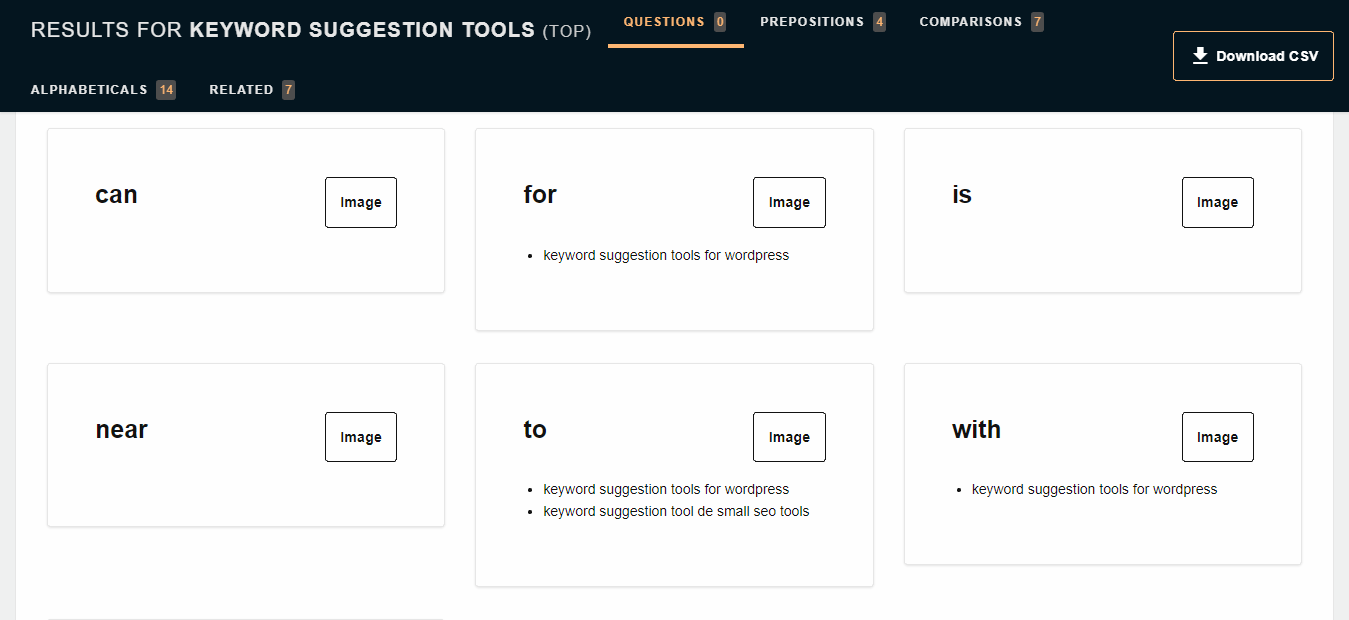
This is one of the best topic suggestion tools I have ever used.
A little secret here ,
The idea of writing this post came from the AnswerThePublic itself!
The AnswerThePublic tool is a different topic & content idea suggestion tool. Here you won’t find any usual report you see in a standard keyword research tool.
This tool works on a simple rule. Enter a keyword, and it will suggest more than 100s of new blog post ideas in the form of questions and phrases related to most search queries on Google worldwide.
It’s free and straightforward to use. Once you start usingAnswerThePublic, You will never go out of content ideas for new blog posts.
Keep in mind, Answer the Public will show you the most relevant questions to the topic you enter, such as “how-to,” “can,” “do,” etc. You can download the visual data in the image format. You can download the suggestions as CSV as well.
The correct way to utilize its full potential is to use a keyword research tool (like the ones later in this post) that shows the search volume and CPC data along with it.
Give AnswerThePublic a try .
Blog Title Generator from SEOPressor

I use this tool quite regularly. Title generator by SEOPressor ( One of the SEO plugins ) has hundreds of title ideas and combinations ready to be used. You can put some of the keywords you like, and SEOPressor will show you the available content ideas in the form of headlines.
They have recently updated their tool, and it’s way much better than the previous version.
Here’s how it works:
- You enter a keyword and select a select the nature of the topic if it is a generic term, brand name, event, and so on.
- The tool shows you more than a 1k blog post headline ideas.
When you are out of ideas, use a keyword research tool to find a long-tail keyword, then use the seed keyword in the blog headline generator to come up with hundreds of new post ideas, and you can use this tool before writing any of your posts to write better headlines.
Go to the idea generator from SEOPressor .
Portent’s Content Idea Generator
Portent’s content idea generator is an exceptional tool. Not only was this one of the first tools to create meaningful headlines, It purely focuses on giving you more vast ideas for new topics.
Portent’s tool analyses your topic and combines it with other powerful and situation-based words. This helps you to get more catchy headlines that are conversion-focused.

- You enter a keyword, and that’s it. The ideas show up. You can keep on refreshing the page to get new combinations.
Go to portent’s idea generator .
BlogAbout is a very interactive tool that lets you play with ideas, and it gives you new topics to write about. It comes with a notebook where you can save multiple headlines and sentences for future access and reference.

BlogAbout is a tool created by Impactbnd for bloggers, and I use it to quickly get new ideas. The outcome headlines are broken into parts, and 2-3 words are editable. You can change the subject, noun, verb, and others to make your own unique headline.
Once you have made plenty of them, save them in your notebook, and BlogAbout will send all of them to your Email.
- You enter a keyword in the BlogAbout tool.
- It shows you editable headlines and content ideas. It’s that simple.
It’s one of the most user-friendly tools I’ve used.
Go To BlogAbout
HubSpot’s Blog Idea Generator
HubSpot’s idea generator lets you add three different nouns, and based on those three nouns, it shows you the topics you can write about to get better conversion and traffic.

On each refresh, The HubSpot idea generator gives you 5 different topics to write about. They would also send you a complete list of more than hundreds of content ideas email.
- You fill up the 3 slots of nouns or keywords. (You can also enter only one or two)
- Boom! 5 results with current topics are shown.
Go to HubSpot’s Blog Idea Generator
Kickass Headline Generator by SumoMe
Kickass Headline Generator by SumoMe is simple to use a tool you can use to generate up to 5 headlines related to any topic you choose. This is based on a post where Sarah Peterson shares some great headline formula for high conversions.
Here’s how Kickass headline generator works:

- You choose from one of the 6 kinds of content headline ideas.
- The tool shows you available topic ideas. Here, you can change the keywords in the blanks as you like. You can change the topic, desire, time, and other options to see which combination suits you.
In a few combinations, you will get the ideas of new posts and headlines.
Although few of these tools are primarily headline generators, you can use them anytime you run out of ideas. They work the best as I’ve experienced so far.
Try Kickass headline generator .
In this competitive age, you can’t rely on random content for getting more search engine traffic. You should be thoughtful enough to prepare a plan in advance on what keywords you want your blog posts to rank for.
No SEO can rely on content creation without keyword research. The content SEO starts from topic research itself.
The moment you start you using a keyword research tool effectively, you will start noticing a vast improvement in organic traffic. It may be slow, but eventually, Google will steadily send you its precious traffic.
Keyword research isn’t dead. I don’t see it going anywhere soon. You should be smart enough to understand how organic traffic comes to any blog.
You target a trending and high-bid keyword on PPC, create a piece of content, do proper SEO, build links to it, and get loads of organic, free traffic from Google.
No matter how informative and valuable an article you write, you won’t get any organic traffic if no one’s searching for it.
That’s why I repeatedly recommend scheduling a time slot for doing keyword research. It’s necessary and vital. Once you make a habit of doing this, New post ideas will keep on coming without bars.
Below are some of the best keyword research tools you can pair up with the topic research tools above.
Ubersuggest

Use this tool to find new keywords and CPC data. UberSuggest is an extremely easy-to-use SEO tool that shows you the best available related keyword and suggestions relevant to the phrase or word you search for.
UberSuggest also shows you the –
- CPC of a keyword
- Related Long-tail Keywords
- Keyword Difficulty
- Competitive Data
UberSuggest is the perfect and quick way to find new long-tail keywords, Content Ideas, and related data for new posts.
Go to UbberSuggest
SEMrush’s Keyword Magic Tool
SEMrush is a full-fledged SEO tool that comes with many powerful features and tools, all in one place.
SEMrush, apart from its site audit and competition analysis tool, also comes with an exceptional keyword research tool named “Keyword Magic.”
You can find correlating and high CPC keywords for any seed keyword you enter with the keyword magic tool. Using it is simple: You enter a primary keyword, and SEMrush shows you related, most search long tail and easy to rank keywords and phrases.
Along with long tail and correlating keywords for a seed keyword, the keyword magic tool also shows you:-
- SERP competitors
- LSI keywords
- PPC, Search volume, SEO Difficulty
- Expression & Feeling related questions (with the seed keyword)
If you want a powerful tool that goes beyond keyword research and blog post idea generation, SEMrush is for you.
Try SEMrush (Free Trial Included)
LongTailPro

LongTailPro is the best keyword research tool for digital marketers. LongTailPro shows you the best keywords available for a particular query or question as the name says itself.
A few weeks back, I started using this tool, and I am highly impressed with the backend and frontend both. The results are easy to go through, and LSI graphs are shown the right way.
LongTailPro is a must-have tool for any SEO or online marketer. Performing keyword research with this tool is an easy task.
Get 7-day trial plus 30% extra discount, Try LongTailPro>>
KWFinder is a freemium tool with premium features.
KWFinder is a keyword research tool that comes from Mangools SEO media. This tool should be your one-stop-shop if you don’t do well with those overwhelming dashboards for techies.
Unlike SEMrush, Ubersuggest, or Answer The Public, The KWFinder is much more straightforward and user-friendly. You enter a keyword, and a screen like this with full data is shown:-

The best part, This tool is free for up to 5 searches a day. KWFinder shows you:-
- New content titles
- Competition ranking for the same keyword on SERPs
- Suggestions for long-tail keywords
- Questions searched on Google.
- Search volume, CPC, and PPC
- Narrow “Local Keyword” Analysis
You can use KWfinder for your day-to-day queries. Here’s a pro tip –
“Find the high volume long-tail keywords with KWFinder, Then search the same seed keyword in Answer The Public. This will give you the number of new ideas for your future blog posts.”
Try KWFinder
SERPstat, a very close competition to SEMrush, is a feature that reaches a keyword planner and research tool with an innovative dashboard and super user-friendly interference.

The best feature of the SERPstat keyword research tool is “missing keyword analysis” This a part of its insights tool, which comes with every plan. I use this to analyze my competitors every week. Here’s how it works:-
- Open the SERPstat keyword overview tool.
- You enter a root domain, Keyword, or URL
- The keyword data is shown along with several custom views, including tree distribution, suggestive answers, LSI, and missing keywords.
With SERPstat, you can also monitor the keywords you want to rank for, along with many additional features, which makes SERPstat a complete SEO toolbox.
Try SERPstat
Topic research is the first step, the next is-
- Optimize posts to rank first on search engines
- Analyze and evaluate On-page & On-Site SEO
- Build Links To The Content You Want To Rank
- Using growth hacking SEO tools for competitive marketing
- If you are using WordPress, Install any of the recommended SEO plugins .
Whenever you are running out of new posts, new topics to write about on your blog, do keyword research and along with that, check out other blogs in your niche, Popular forum threads to know more about what people are asking for.
Choose LongTailPro if you are a beginner and unfamiliar with the Competitive side of content planning. LongTailPro has a set of tutorial videos to help you guide through the whole procedure.
Choose KWFinder if you want to have a free tool that helps you out with teaching the basics. This tool has the most beginner-friendly dashboard I have ever seen.
If you want to have a robust tool that helps you go beyond keyword research, use SEMrush.
Every tool in this list is ideal for every niche. No matter if you are a small blogger or a product website, you can use these tools to perform an in-depth keyword analysis every time you plan to write a new post.
Targeting long-tail keywords is a good practice but make sure you are using the LSI keywords as well. Make a routine of doing topic research regularly and stick to it.
In the end, it is all about content. Your content should have a focus keyword for sure, but that doesn’t mean you forget about its quality and readability while doing so.
Share your favorite tool in the comments section below and tell us about any other tool you would like us to know about.
Do remember to share this post on your favorite social media.
Reader Interactions
October 24, 2018 at 11:34 pm
If you like Answer The Public, you’ll probably also like QuestionDB ( https://questiondb.io/ ). It’s a lot like Answer the Public, except that it gets data from community sources rather than just Google.
December 11, 2018 at 12:01 pm
Thanks for the tools and their information. I would like to use SEMrush though.
Leave a Reply Cancel reply
Your email address will not be published. Required fields are marked *
Save my name, email, and website in this browser for the next time I comment.
Subscribe to BforBloggers
Get latest content delivered to your email every week on Monday. No spam, no marketing.
Subscribe to Our Weekly Digest
Every Monday, get a digest of top articles straight to your inbox.
No spam or promotional emails.

Our Blog Topic Ideas Generator is an innovative tool designed to help bloggers and content creators effortlessly generate fresh and engaging topics for their blogs.
Simply enter a keyword or a general idea, and our generator will provide you with a list of creative and relevant blog topic suggestions.
Bloggers, content marketers, and anyone struggling with writer's block or looking for inspiration in creating new content can benefit from this tool.
Yes, our basic version is free to use. We also offer a premium version with advanced features for a small fee.
Absolutely! Our tool allows you to tailor the suggestions based on your specific niche or preferences.
You can generate an unlimited number of blog topic ideas. However, the number of ideas per session might vary based on your subscription plan.
Yes, our tool is designed to produce unique, SEO-friendly topics that can help increase your blog's visibility and engagement.
No technical skills are required. Our tool is user-friendly, and you can start generating blog topic ideas with just a few clicks.
Yes, our Blog Topic Ideas Generator is versatile and suitable for a wide range of blog niches, from lifestyle and tech to business and health.
We regularly update the tool with new features and improvements based on user feedback and the latest content marketing trends.

Fresh Blog Topics Research Using These FREE Tools
Topic research is probably the most important and quite a time taking process in blogging, I guess. Most of the time bloggers, especially the new bloggers, stay confused about what to blog about.
Blogging about a topic that is new and recently in trend can be a better option than that of the old and not-trending ones for bloggers who are just starting up in the field.
In this blog post, I will be showing how you can use these FREE tools in order to research new and recent blog topics. This way you can generate a lot more traffic than you were generating earlier.
Let’s get started…
✅ Content is the king.
You agree with the above quote or not, but this is the Universal Truth . If you provide contents that nobody else does, then your blog will grow, for sure.
According to me contents can be divided into two main types:
- Long-Lasting or Evergreen Content: No doubts, these types of content never gets old. Creating evergreen content is comparatively more effort taking. If you are a new blogger then creating long-lasting content and taking it to the first page of Google can be tougher than you expect.
- Trending or Fresh Content: If you’re just starting up with blogging then I would recommend investing your time in writing fresh and trending content. Writing on recent topics will get you ranked easily as compared to the evergreen one.
Each type has its own advantages and disadvantages. Trending content get ranked easily and long-lasting ones take time to rank but stay useful for a longer period of time.
Tools for Researching Fresh & New Blog Topics
- Google Trends
- Answer the Public
- Social Media
So, I will be describing these tools in this blog post.
1. Google Trends
When it comes to research trending and recent blog topics, I keep Google Trends at the top. It is an exceptionally useful and intelligent tool that can tell you what topics are in trend.
Not only a powerful tool but is completely free and easy to use. It can help you choose trending topics from the various niches.
In order to search for the topics, visit Google Trends , and from the left side menu select Trending Searches which will take you to a page like this:

You will find trending keywords, their searches, and trending articles on that page. You can change the country from the top-right corner in order to view the topics of your country.
Below I have embedded Google’s Trending Searches page which will show the live data.
You can even use the Search Feature if you want to know about the trending topics of any specific niche by searching your niche. For example, I searched for the term “WordPress” and selected a country like India, got this result:
You can filter the search results by geographical location, time period, category, and type of search.
This way you can get the topic for your next blog post easily. Choose the one in which people are taking much more interest over time.
2. Answer the Public
Ever heard of the tool?
Well, Answer the Public is an excellent tool that takes data from Google and Bing in order to show various popular questions and related queries that people search on these search engines.

The website organizes all the contents in such a nice and cool way that becomes much easier for you to analyze those results.
In order to get topic suggestions from the website, first, visit the website Answer the Public , search your niche or queries and it will show you the various popular questions that people really search.

The website is completely free to use and you can even download the search results in CSV or Image format for future uses.
Alltop is an amazing tool for getting topic ideas for your blogs. It mainly shows trending articles from various sources using which you can easily find out what topic is in trend these days.

The website aggregates all the top recent news and happenings in one place in different categories.
You can choose the category of your interest and instantly find out what people are reading about these days.
Whenever you run low on ideas, just turn over to Quora . It has some of the World’s most intelligent people who regularly share their wisdom with people.
Quora has a large… large number of questions in its database. It lets you know about the real questions coming from the people.

Just write your niche in the search box and press enter, you will be flooded with the hundreds of questions that people ask in that niche. Using these search results you can easily decide the next post topic of your blog.
You can even drop a question and ask people for suggestions related to your blog topics.
5. Social Media
Who doesn’t know about social media!!! It’s powerful.
You can use social media like Twitter and Facebook in order to get recent blog topics for your blog.
You can search your niche or keywords on Twitter, Facebook, and other social media platforms to get trending topics.
For example, I searched “ #bitcoin ” on Twitter and got many recent news, discussions, and questions on the topic.

This way you can generate a lot of topic ideas for your next blog post using these social media.
Final Words
These are not the only tool that can be used to research fresh, new, recent, and trending topics for your blog post but these are the ones that are used by many bloggers out there.
Just keep in mind that writing on trending topics will rank you easier and faster and this is highly recommended if you are a new blogger.
Any other topic research tool that you wanna add? Mention them in the comments.
And, that’s it for now.
Happy Blogging!
Blogging since 2015 and loves writing about business and tech. Follow him on Twitter for interesting insights on blogging, SEO, and affiliate marketing.
Similar Posts
![blog topic research tools Newsletter Directories and Aggregators [List]](https://i0.wp.com/compile.blog/wp-content/uploads/2021/04/Newsletter-Directories-and-Aggregators.jpg?fit=768%2C512&ssl=1)
Newsletter Directories and Aggregators [List]

Best Copywriting Strategies to Write Great Blog Posts

10 Reasons Why Your Blog is Not Growing

Moving from WordPress.com to Self-hosted WordPress

7+ Less Known Free Keyword Research Tools

Blog Post Repurposing – Best Content Distribution Strategy
Leave a reply cancel reply.
Your email address will not be published. Required fields are marked *
Save my name, email, and website in this browser for the next time I comment.
- Memberships
Best blogging Tools to Increase Your Productivity as a Blogger

You will be amazed to know that there are more than 600 million available online (Master Blogging). However, building and retaining your identity in this competitive field isn’t so simple. You have to work passionately to write original, high-quality, informative, SEO-optimized, error- and plagiarism-free blog posts.
Moreover, to maximize the effectiveness of your blogs, you must include visual components and other necessary SEO factors. Meeting all these requirements on your own isn’t possible or practical. Thankfully, there are online tools available that can help you with various requirements, from writing and editing content to conducting keyword research, optimizing SEO, and promoting your work.
However, be careful not to trust every other tool available on the web, as your efforts can’t be compromised over low-quality tool usage. For a successful blogging journey, you must invest in credible and competitive tools. Some of the best blogging tools to increase your productivity as a blogger are thus mentioned in detail below.

SmallSEOTools.com – Plagiarism Checker

The plagiarism checker by SmallSEOTools.com provides excellent protection against plagiarism and its consequences. The plagiarism detector possesses advanced AI algorithms to scan and compare submitted text against billions of web pages and databases. It accurately detects any form of plagiarism and highlights the plagiarized sentences.
Moreover, when you check plagiarism online, the results mention the matched sources with complete web addresses. The plagiarism detector can be a handy option for bloggers who are new to the field. Its intuitive interface allows them to check plagiarism seamlessly without any hassle.
Top Features
- Advanced AI algorithms scan billions of web pages and databases.
- Detailed plagiarism reports contain matched texts and their sources.
- Helps avoid accidental plagiarism and the aftermath involved.

Bloggers can leverage Grammarly to fine-tune their voice and sentence delivery style. Moreover, they can set writing goals to get customized suggestions for their content’s domain, intent, audience, and formality. As a result, bloggers can create content with correct grammar and punctuation and a personalized writing style and tone.
Additionally, Grammarly can be integrated into your browser by installing its extension at no cost. However, if you need more advanced features like plagiarism checks, full-sentence rewrites, and vocabulary enhancements, you have to get the premium plan. Thus, make your content more polished, professional, and error-free with Grammarly.
- Makes blog posts errors free.
- Customized grammar and language suggestions.
- Easily integrated into browsers and desktops.
Paraphrasing-Tool.net
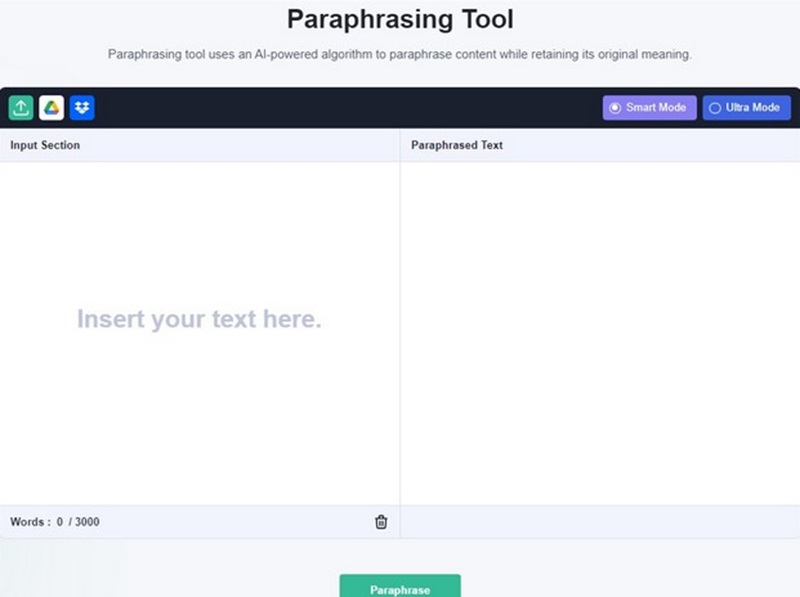
Therefore, bloggers should get automated help from Paraphrasing-Tool.net. This tool is designed using cutting-edge NLP (Natural Language Processing) algorithms that understand and modify human language to give human-like results. The paraphraser restates the submitted text into an entirely different version while retaining its main idea.
This paraphrasing tool is especially useful when bloggers are short on deadlines and must write multiple posts daily. Furthermore, the paraphrase tool helps them repurpose their old content in just a single click. They can paraphrase previous articles quickly and efficiently without committing plagiarism.
- Makes blog posts unique and plagiarism-free in a single click.
- NLP technology delivers human-like results.
- Aids in repurposing outdated content without any effort.

It is a WordPress plugin designed to ease the optimization process for novice and expert bloggers alike. With it, you can cover all the SEO basics and ensure that all your blog posts are well-optimized. For instance, you can generate sitemaps, easily be found by search engines, optimize according to search engine requirements, and fulfill technical SEO criteria.
Moreover, the premium version offers some extraordinary features for bloggers, like optimizing blog posts for secondary keywords, suggesting links to other pages on the website while writing, insights into the words and phrases primarily used in a blog post, etc.
- Simplifies SEO optimisation
- Fulfils technical SEO criteria
- Optimize for secondary keywords
Google Keyword Planner

They can perform keyword research to gain valuable insights into the most common words and phrases their audience uses as a query. The Google Keyword Planner helps bloggers achieve higher rankings on Google and other prominent search engines by ensuring they’re targeting the best keywords with the highest traffic and lowest difficulty to rank for.
It gives two basic options: find keywords and get search volume and forecasts. The former performs standard keyword research, while the latter generates performance reports on forecasts for entered keywords’ lists.
- Research rigger keywords.
- Identifies keyword metrics.
- Offers two distinct ways for learning keyword insights.

However, creating high-quality and optimized images isn’t a piece of cake for bloggers. They either need to use costly design and editing tools or hire professionals, both of which can be expensive options.
A stock photo library tool like Pexels is here to remove all their visuals-related worries. It lets users find amazing, high-quality, appropriate stock images for free. Pexels offers hundreds of eye-catching visuals that belong to every niche. You can use them as is, or you can make a few modifications and edits according to your blog’s requirements.
- Provides free-of-cost visuals.
- Prebuilt images make life easier.
- High quality and hundreds of images for every niche.
Blogging isn’t as straightforward as it may seem. With colossal competition and must-have requirements, being a blogger is all about being a multitasker. You need to be a designer, an SEO specialist, a content writer, and a website maintainer. However, applying effective strategies and valuable tools to the journey can make it a breeze. For instance, you can harness the power of rewriting with a paraphrasing tool and quickly bring new life to your outdated posts. Similarly, you can utilize the plagiarism checker to verify that your blogs are free from duplication and plagiarism.

Vincent van Vliet
Vincent van Vliet is co-founder and responsible for the content and release management. Together with the team Vincent sets the strategy and manages the content planning, go-to-market, customer experience and corporate development aspects of the company.
ALSO INTERESTING

Breaking Down Behaviorism: The Basic Principals Behind Behavioral Learning

Exploring the Importance of Emotional Intelligence in Healthcare
How print on demand services are empowering global festivals.
Comments are closed.
BOOST YOUR SKILLS
Toolshero supports people worldwide ( 10+ million visitors from 100+ countries ) to empower themselves through an easily accessible and high-quality learning platform for personal and professional development.
By making access to scientific knowledge simple and affordable, self-development becomes attainable for everyone, including you! Join our learning platform and boost your skills with Toolshero.

POPULAR TOPICS
- Change Management
- Marketing Theories
- Problem Solving Theories
- Psychology Theories
ABOUT TOOLSHERO
- Free Toolshero e-book
- Memberships & Pricing
10 Content Marketing Tools That Will Make Your Job Easier
Content marketing tools help with collaboration, tracking, analysis, and communication — and bridge the gap between marketing and sales.

Table of Contents
Good salespeople know that it’s not a great idea to try the hard sell on prospects the very first time you connect. First, you need to build a relationship and establish your credibility.
Marketers need to take the same approach. That’s where content marketing comes in. By creating valuable resources, information, tools, and other forms of content for your audience, you make sure you’re top of mind when it comes time to make a purchase.
Content marketing is a big job. Content marketing tools make that job significantly easier. They also allow for better collaboration, tracking, analysis, and communication. All of this can help bridge the sometimes difficult gap between marketing and sales, making both teams more effective.
Bonus: Download our free, customizable social media calendar template to easily plan and schedule all your content in advance.
What is a content marketing tool?
A content marketing tool is any tool that allows content teams to improve, simplify, or better manage their marketing work. This includes a wide assortment of tool categories to help with the many aspects of marketing content creation.
From spurring ideas to implementing designs to automating social media posts , there are many great content marketing tools to make a content marketer’s day more productive and less stressful.
Let’s take a look at some of the best.
10 best content marketing tools for 2024
1. hootsuite.

Start free 30-day trial
Rather than a single content marketing tool, Hootsuite is actually a suite of content marketing tools built with the unique needs of social marketers in mind. It can benefit content marketers at every stage of the content creation and management process.
So, let’s start at the beginning – with the spark of an idea. Or maybe you don’t have one? Either way, OwlyWriter AI can help. This AI tool that’s built into the Hootsuite dashboard just needs a simple prompt to create captions and post ideas that are appropriate for your brand.
Whether your content comes from AI or from the sharp minds of your team, you can then use Hootsuite’s composer to set up your social media posts. Add existing image and video assets, or choose royalty-free images from the built-in image library. There are built-in workflows and approval processes, too. These keep your team working collaboratively during this process.
You can create new custom visuals within Hootsuite through the integration with Canva. Or, fine-tune your text directly in the composer through the integration with Grammarly.

Once your post is ready to go, it’s time to schedule it with the Hootsuite calendar, a drag-and-drop tool that allows you to plan out your social content across multiple platforms. It even includes recommended times to post for maximum engagement.
If you want to dive deeper into the best times to post for each platform , check out the heat maps in Hootsuite Analytics to see a detailed chart of when your audience is online for each platform.
Of course, reviewing your analytics is also an important part of your content marketing work, since understanding what works well (and what doesn’t) helps you improve your efforts over time.
Finally, to make sure you effectively drive traffic to your longer content pieces from platforms that don’t allow links (*ahem* Instagram *ahem*), you can create an easy-to-manage link in bio page using Hootbio.

Canva is an incredibly useful design tool for content marketers. From social media posts to email newsletters to videos and websites, Canva has more than 600,000 templates in their premium collection as well as thousands that are free to use.
It’s an intuitive and easy-to-use tool that allows even non-designers to create visually appealing content marketing assets.
Hootsuite users can access Canva directly through the Hootsuite Composer, so you can use their templates to enhance your content creation without having to switch between content marketing tools.
3. Google Workspace

Source: Google Workspace
Formerly known as G Suite, Google Workspace is the business-oriented version of Google’s suite of tools. The tools are particularly useful for distributed teams, as the cloud-based tools ensure team members can collaborate effectively online. They’re also useful for ensuring multiple stakeholders can provide feedback without creating version control issues.
Google Docs is the primary tool for getting your content into a file and sharing it among colleagues, while Google Keep is an effective notes tool for jotting down content ideas. Google Meet, Google Calendar, and Google Chat allow teams to communicate both in real time and asynchronously.

Source: Lumen5
Lumen5 is a drag-and-drop tool for creating video content. One important feature for content marketers: It uses AI to create videos directly from a blog post. You can then fine-tune the video using the detailed editing tools.
The built-in media library includes valuable content marketing resources like licensed photos, stock videos, and music to make your video content creation easier.
5. WordPress

Source: WordPress
WordPress is an especially useful content marketing tool for small businesses. It’s a content management system (CMS) that makes it easy to create, update, and manage content for your blog or website, even with no design skills.
WordPress architecture is SEO-friendly, and plug-ins can help you maximize the SEO impact of your content. WordPress sites look great on both desktop and mobile, too.
6. Brafton Content Marketing Platform

Source: Brafton
This content marketing platform is designed to track and manage your content from ideation through to publication. All your content projects are in one place so the relevant team members and stakeholders can find them and see where they are at in the creation process at any time.
Project dashboards include timelines, image assets, content briefs, deliverables, and messaging, so you never have to go digging through your email for project details.

Source: Vidyard
Vidyard is a video creation and hosting platform that allows content marketers to integrate videos into email as well as web and social content. The interactive playback features mean you can incorporate video calls-to-action as well as in-video forms.
When developing your video content, you can record your screen or use your webcam to record yourself. Or, you can record both at the same time. The built-in analytics and SEO optimization help ensure your videos make the most impact on your content marketing strategy.

Source: Ahrefs
Ahrefs is a content marketing tool that helps you build content addressing topics your customers are already looking for online. The keywords explorer helps you find new keyword ideas, then analyzes each option to determine how hard it will be to rank for that term. You can also use the tool to track and analyze existing keyword sets.
For video content marketers, take note that Ahrefs allows you to measure the popularity of search queries in YouTube as well as the major search engines.
There’s also a content search engine to help you analyze content that’s already working in your niche, especially on low-competition topics.

Source: SEMRush
SEMRush is another keyword and SEO tool to help ensure your content marketing assets connect with your audience. In addition to extensive keyword discovery and analysis tools, SEMRush helps you find popular topics and questions to address in your content marketing.
Once you get started creating, there’s an SEO content template to help you rank and an SEO writing assistant to check your SEO score and improve readability.
10. Hemingway App

Source: Hemingway App
The Hemingway App is a powerful free content marketing tool. You can just copy and paste your content into the Hemingway Editor, and you’ll get a reading level score. (Hint: aim for a grade 8 reading level to get the most impact from your content.)
You’ll also get tips on how to improve the readability score, with problem areas highlighted for your attention. The reading level updates in real time, so you can keep going until you reach your target level.
Free content marketing tools
Looking for some free content marketing tools you can use right now, without even having to create an account? We’ve got you. You can use all of these content tools directly from your web browser, no credit card or sign-in required.
AI caption generator
This is one of Hootsuite’s free content creation tools for social media. Need to create content for Instagram, Facebook, X (Twitter), TikTok, Instagram, or Pinterest? You can do it here with just a few quick inputs. Choose your network, select a style and language, and enter a short description and keywords. This tool will create the caption you need for your social post.
The style options range from cheeky to grumpy, from casual to formal, and even include specific tone options like makeup influencer or true crime podcast host.
Since I’ve got the Yule Log playing on my TV as I write this and I’m sipping a cup of tea, I thought I’d ask the tool to create a relevant caption in the voice of an 18th-century poet. And did it ever deliver.

If you need content creation tools for other social media platforms, check out our Instagram Threads generator as well as our generators for YouTube video descriptions and titles .
AI blog ideas generator
For longer content pieces, this blog ideas generator is incredibly helpful. Choose your language, then enter up to five nouns and your primary keyword. The tool will suggest a few blog titles along with subtitles or short content descriptions.

AI content ideas generator
Need ideas for a content platform other than a blog or social media? This is your tool. Using the same process as above, you can generate content ideas for white papers, videos, podcasts, infographics, and more.
Let’s say I’m so motivated by this fireside writing thing that I want to start a podcast:

Keep in mind that while all of these content tools are powered by the same chatbot AI behind OwlywriterAI, they are essentially “lite” versions of the tool. For instance, OwlyWriterAI allows content marketers to choose from post types such as “problem, agitate, solution” and “attention, interest, desire, action” posts.
Social media dictionary
Here’s one last free content marketing tool for you. This one’s not powered by AI, but it is powered by the social media experts at Hootsuite.
It’s technically called a social media dictionary, but really it’s a good place to look up any term that’s entered the zeitgeist but may not yet be fully understood in corporate environments. Use it to explain to your boss why that reply guy gives you the ick .

Create. Schedule. Publish. Engage. Measure. Win.
6 tips for making the most of your content marketing tool
1. develop a strategy.
Less than half of B2B or B2C marketers have a documented content marketing strategy. Thinking strategically about your content marketing plan gives you an automatic head start. Digging into how your content marketing tools can support that strategy and open up new possibilities gives you even more advantage.
Strategic planning should be involved in every aspect of your content marketing, and the tools listed above are all designed to help.
2. Focus on relationships
Content marketing gives you the opportunity to connect with your audience so you can gain their trust and loyalty over time, rather than jumping in and trying to make a sale right off the bat.
The best content marketing tools offer detailed insights into your audience that help you understand how best to connect. Social media content marketing dashboards with advanced analytics tools (like Hootsuite ) can help you understand the demographics of your audience , as well as where and when they spend their time online.
You can also learn what subject areas they’re most interested in, and what content types are most effective for sharing the content you create .
This all feeds back into the strategic planning we talked about in the tip above. When you have tools that help you understand your audience , you can better hone your strategy for effective content marketing.
3. Plan ahead
Once you have a strategy and your audience research in place, it becomes much easier to plan ahead.
Sure, every content person is always thinking about marketing campaigns for the big annual events like back to school and the winter holidays. But what about all the smaller events throughout the year that could spark content creation ideas? Planning in advance gives you the opportunity to peg your content to events that resonate with your audience, increasing the chances they’ll be reshared.
Hootsuite’s calendar has holidays and events built in, so you’ll never miss an event like International Tea Day. And if you have no idea what on earth to say about an event like International Tea Day, you can just click on the name of the holiday and OwlyWriterAI will create appropriate social media posts for you. The posts might even spark ideas for larger content pieces.
Planning ahead also ensures your content marketing strategy is aligned across platforms, from email to your blog to your social channels.
4. Work in batches
Creating your content in batches allows you to stay focussed on one task at a time, then move on to the next. This is much more effective than constantly worrying in the back of your mind about the TikTok you absolutely must create at 12:05 p.m.
Working in batches also allows you to make the most of keyword research and content themes. As you uncover interesting new information relative to your next content marketing project, you can weave it into blog posts, email newsletters, and social media posts.
A content marketing tool allows you to frontload your effort by creating multiple pieces of content in one work session, then loading into the appropriate time slots on your content calendar . Social media content management tools will post the social content at the pre-set times without any further input from you, so you can focus on getting out your blogs and drip campaigns.
5. Set up team processes
When you’ve got multiple people creating content, things can get … complicated. Great content creation tools have built-in workflows that allow your team to create and collaborate more effectively.
Workflows that include appropriate approval systems mean that even the most junior team members can create content directly in the tool from which it will eventually be posted. Senior team members can review, provide feedback, and sign off when the post is ready. Everyone gets to do their best work without any copy-and-pasting, version control issues, or concerns about content going live before it’s approved.
This makes life easier for all content marketing teams, but it’s especially important for teams working in the regulated industries . Content marketing tools like Hootsuite (which is FedRAMP-certified) allow you to build specific compliance requirements and principal approval into your workflow so everything is always done by the books.
6. Centralize your brand assets
Content marketing tools can help ensure your team is always using the latest brand assets. For example, Hootsuite’s content library is a good repository for approved product and editorial images, logos, templates, and videos.
Once your content goes live, you can give employees access to the full approved posts through Hootsuite Amplify so they can share with their own networks in just a couple of clicks. This ensures that your content marketing efforts have an extended reach and your team is always on brand when they share about the brand on social.
Save time managing your social media presence with Hootsuite. From a single dashboard, you can publish and schedule posts, find relevant conversions, engage the audience, measure results, and more. Try it free today.
Get Started
Do it better with Hootsuite , the all-in-one social media tool. Stay on top of things, grow, and beat the competition.
Become a better social marketer.
Get expert social media advice delivered straight to your inbox.
Christina Newberry is an award-winning writer and editor whose greatest passions include food, travel, urban gardening, and the Oxford comma—not necessarily in that order.
Related Articles

20 Top Social Media Tools To Make Your Life Easier in 2024
The right social media tools can help you create content, engage with your audience, analyze your performance, and so much more.

10 AI Content Creation Tools That Won’t Take Your Job (But Will Make it Easier)
AI-content creation tools can’t replace great writers — but they help writers and marketers save time and use their skills for more strategic aspects of content creation.

7 Social Media Monitoring Tools SMMs Can’t Live Without
Learn how to use one (or all) of the best social media monitoring tools to help you track and manage online conversations about your brand.

21 of the Best Social Media Analytics Tools for Smart Marketers
Are you a social media marketer who wants to better focus your time, effort, and budget? It’s time for some new social media analytics tools!
The ALL-IN-ONE social media performance engine. Now half off.

Information Technology
Search form.
- Technology Help Desk
- How-To Articles
- IT Services Portal
- Ticket Status
- Feature Articles
- Alerts & Announcements
- Customer Success Stories
- In the News
- IT Events Calendar
- Report a Security Concern
- Accounts & Access
- Data Classification & Compliance
- Security Awareness Training
- Vendor Risk Assessment
- Services by Category
- Software for Faculty
- Software for Staff
- Software for Students
- Software for Research
- IT Training & Development
- On-Demand Learning
- Instructor-Led Training
- Training Content Development
- Tech Ambassadors
- About Pitt IT
- Office of the CIO
- Leadership Team
- IT Vision and Strategy
- Community Engagement
- IT 10-Year Horizon
You are here
6 essential it tools for researchers.

Advances in research computing have propelled Pitt to the forefront of research, with the University ranking third nationally in NIH funding in FY23. Researchers utilize robust technology to collect, store, and analyze data; document and manage lab processes; and work with collaborators. Pitt IT supports the work of researchers, so they can focus on doing what they do best: making the University of Pittsburgh one of the top research institutions in the world! Here are the top six tools researchers at Pitt can start using today.
1. Collect Participant Data (Qualtrics)
For research involving self-reporting or participant feedback, you need a robust survey tool that is easy to use. The Online Survey System (Qualtrics) enables you to create and distribute surveys for everything from collecting demographic info or tracking daily activity, to monitoring symptoms or exploring participant beliefs. The system requires minimal experience or training, is extremely user-friendly, and is available at no cost to all Pitt researchers, faculty, staff, and students. Qualtrics securely gathers and stores survey data, allows for complex decision trees based on previous responses, provides easy access to raw data, compiles and analyzes results, and creates high-quality charts and graphs to visually present the data.
2. Document and Manage Lab Activities (LabArchives)
Pitt offers Electronic Research Notebooks (LabArchives) at no cost to help you keep track of all your notes, data, and findings in one place, from nearly any type of device. ELNs can be used to organize and manage all aspects of lab activity, from study protocols and testing progress to documenting results. Notebooks can include any kind of input, including text, tables, images, and sketches. You can also share and collaborate on notebooks with research partners and lab staff.
In addition, LabArchives Scheduler and Inventory modules help manage and organize all aspects of lab activity. Scheduler provides a calendar and scheduling service to simplify the management and booking of equipment and spaces, such as microscopes, flow cytometers, recording space, microphones, and other items. Inventory enables you to streamline inventory management via a simple, customizable solution that allows you to include inventory types and storage locations, add and manage lab inventory items, and generate shopping lists.
3. Store Large Data Sets (Enterprise Cloud Storage)
Enterprise Cloud Computing (ECC) gives researchers access to virtual computing resources in a safe and reliable way. The most widely used ECC platform for large-scale storage and robust compute power is Microsoft Azure . Azure provides resources to tailor specific solutions to your data storage needs, without the extra time or cost of purchasing, setting up and maintaining a server. Azure lets you archive data inexpensively, provide shared file storage, and store and compute data in an environment with HIPAA-compliant protections for data privacy.
4. Transfer Large Data Sets (Globus)
Research often generates very large data sets, which presents challenges when transferring and sharing the data with collaborators. Pitt’s Enterprise Data Transfer Service (Globus) subscription lets users transfer and share files with ease, no matter the location of you or your collaborators. You can move and share data between on-premises and cloud storage, with external institutions, and between endpoints/devices. Users can also develop applications and access gateways by leveraging Globus’s advanced identity management, single sign-on, search, authorization, and automation capabilities. A free Globus subscription is available to all Pitt researchers, faculty, and students.
5. Visualize Your Results (BioRender)
BioRender is used to create and edit scientific diagrams and illustrations for use in posters, papers, presentations, and publications. The web-based app has over 40,000 icons and a large stock image collection that spans subjects such as neuroscience, immunology, microbiology, and more. The app makes it easy to create sophisticated figures by using an intuitive interface with drag and drop tools—no artistic skills needed. BioRender also lets you work collaboratively on figures. Faculty and staff receive BioRender at a significantly discounted price (just $100/year for each user). Students have free access to help them learn how to visually present scientific concepts and data in their projects and papers.
6. Access Supercomputing Resources (ARCS)
The Center for Research Computing (CRC) and the Pittsburgh Supercomputing Center (PSC) work closely with Pitt IT to provide Pitt researchers with the computing power needed to engage in large-scale processing. They are used by researchers in STEM fields, who often engage in large-scale modeling and simulations, as well as those in the humanities, who need high-throughput computing to analyze large repositories of digitized source materials.
The CRC supports leading-edge research with free access to up to 25,000 computational hours on advanced computing hardware and software for fields across the entire research community, along with training and consultation by CRC research faculty. The PSC is a joint venture with Pitt and CMU, and provides forward-looking technology solutions to advance research nationwide while also coordinating the research endeavors of each university to enhance cooperation.
Get Started and Get Help
Learn more about the IT resources for researchers on the Pitt IT website, including what each app can do and how to access each service. If you need help with any of the resources or need advice about addressing a technical issue your research project is facing, contact Pitt IT’s Technology Help Desk . You can also access a wealth of information about support and training services through:
- Pitt Research and Office of Sponsored Programs (OSP)
- Clinical and Translational Science Institute (CTSI)
- Health Sciences Library System (HSLS)
Happy researching!
-- By Karen Beaudway, Pitt IT Blogger
- Data Science
- Data Analysis
- Data Visualization
- Machine Learning
- Deep Learning
- Computer Vision
- Artificial Intelligence
- AI ML DS Interview Series
- AI ML DS Projects series
- Data Engineering
- Web Scrapping
- Top 10 Free AI Tools for Video Editing
- Top 10 AI Tools for Sales (Free and Paid)
- Top 10 Best AI Tools for Startups in 2024
- Top 12 AI Testing Tools for Test Automation in 2024
- 10 Best AI Tools for Small Business Owners
- 10 Best AI Tools for Academic Research in 2024
- Top 10 Free AI Writing Tools for Content Creators
- 10 Best AI Tools for Lawyers (Free + Paid)
- Top 10 AI Content Creation Tools
- Top 10 AI Photo Editing Tools for Beginners in 2024 (Free & Easy!)
- Top 12 AI Tools for Digital Marketing: 2024 Edition
- Top 10 AI Tools for Data Analysis
- 10 Free AI Detection Tools
- 10 Best AI Tools for Contract Review
- Top AI-Powered Image Enhancing Tools
- Top 10 AI Tools for Podcasters: Exclusive List [2024]
- Top 10 Keyword Tool.io Alternatives for Keyword Research (Free) - 2024
- 10 AI Tools to Create Amazing Infographics
- Top 7 Best AI Tools for Accounting
Top 10 AI Tools for Creating Research Papers
AI tools are very easy to use and are of great help. Creating research papers requires high-end information that an AI can provide. AI tools designed specifically to help in the process of writing research papers have emerged as invaluable resources for researchers. These tools increase advanced algorithms and natural language processing (NLP) techniques to assist researchers at different stages of the writing process.
Use the tools that highlight the key features and are useful for the research. It helps in generating reviews on literature and also offers solutions to challenges.
PDFgear Copilot
Connected papers, research rabbit, faqs – top 10 ai tools for creating research papers.
Here is the list of top 10 AI tools for creating research papers:
QuillBot is an AI tool that can paraphrase sentences while the meaning remains the same. It employs advanced algorithms to generate alternative wordings, making it useful for writers seeking to enhance clarity or avoid plagiarism. QuillBot offers an easy to use interface and supports multiple languages, catering to diverse writing needs.

- Users can discover academic literature by providing personalized recommendations and search tools.
- Helps in organizing research materials using tags, annotating articles for easy retrieval.
- Offers multiple features for collaboration with colleagues.
- Helps in enhancing the writing quality.
- Helps in preventing plagiarism.
- Limited context is provided.
- Accuracy is limited.
- Free plan available.
- Monthly at $9.95 per month.
- Yearly at $4.17 per month.
Link: https://quillbot.com/
Bit AI is an AI tool that generates content which can be used for articles and blog posts. It uses machine language to understand and create content similar to human writing styles. It makes content accessible to a vast audience.

- Helps in summarizing the articles using machine learning, and extracts key information.
- Mimics the human writing styles that appear natural and engaging.
- Simplifies the complex texts and makes it highly accessible on different platforms.
- Highly versatile in providing content.
- Helps in saving time.
- Highly dependent on database access.
- Limitations in understanding the issues.
- Free plan available
- Pro at $12 per month
- Business at $20 per month.
Link: https://bit.ai/
Scite is an AI tool that analyzes academic literature to evaluate the reliability of scientific claims. It employs citation analysis and natural language processing techniques to identify supporting or contradicting evidence for research findings. Scite helps researchers assess the credibility of research articles and make informed decisions based on evidence.

- Analysis academic literatures to enhance reliability.
- Identifies supporting evidences to research findings and helps in creating credibility in the content collected.
- Provides evidence based research and content for exploring in this vast range.
- Helps in research and explorations of literature.
- Evidence based decision making.
- Highly dependent on citation data.
- Limited scope in content.
- Individual at $10 per month
- Team can be customized.
Link: https://scite.ai/
PDFGear CoPilot is an AI tool that processes documents and converts converts PDF files into various formats with high accuracy. Offers a wide range of features like text extraction, image recognition, and document conversion, facilitating easy integration of PDF content into different applications. It manages documents and enhances productivity.

- Automates the analysis of research papers and provides useful insights.
- Saves time in performing operations.
- Free download for android
Link: https://www.pdfgear.com/pdf-copilot/
Concessus is an AI tool that is highly collaborative. Offers a wide range of features like document sharing, discussion forums, and project management tools, enabling teams to collaborate effectively. It enhances communication and productivity in content among the researchers.

- Provides various tools for document sharing and discussion forums for collaboration.
- Allows sharing of knowledge and resources withing teams and enhances communication.
- Allows organization of research papers, and tracks progress.
- Helps in improving productivity by shatying organised.
- Offers collaboration between users.
- Highly dependent on data integration.
- Learning curve is steeper.
- Premium at $8.99 per month
- Teams at $9.99 per month
- Enterprise is customized.
Link: https://consensus.app/home/
Connected Papers is an AI research tool that visualizes the connections between research papers. It analyzes networks to identify related works and clusters them into interactive visualizations. It helps researchers explore literature, discover new connections, and gain insights into the structure of academic knowledge.

- Analysis networks and allows creating connection between research papers and identify related work.
- Generates interactive visualization of clusters to helps users in exploration of new litrature.
- Users can navigate among related litrature in an easy to use interface.
- Simplifies the research process.
- Highly accessible to a vast audience.
- Limited data coverage is provided.
- Highly complex citation.
- Academic at $3 per month.
- Business at $10 per month.
Link: https://www.connectedpapers.com/
Litmaps is a literature mapping AI tool that helps researchers organize and visualize literature. It enables users to create interactive maps of research topics, authors, and citations, facilitating exploration and analysis of academic knowledge available online. Helps in reviewing litrature and provides evidence based decision making.

- Allows users to create interactive maps of research topics and provides visualization of academic literature.
- Provides tools for organizing research papers and managing large collection of literature.
- Allows users to collaborate among themselves and eases knowledge sharing and editing easy.
- Helps in visualization of content and mapping.
- Easy for collaboration and sharing knowledge.
- Highly dependent on data sources.
- Free for students, businesses, teams and organizations.
- Pro at $10 per month.
- Teams are customized.
Link: https://www.litmaps.com/
Jenni is an AI tool used to help in virtual research. Designed to help users find and organize articles. It employs natural language processing to understand user queries and retrieve relevant literature from academic databases. It helps in the research process and provides personalized recommendations.

- Acts on virtual research assistant that helps in finding and organising the articles.
- Has an natural language processor to understand user issues and provide relevant information.
- Provides personalized recommendations and management tools.
- Enhances productivity by focusing on recommendations and managing tools.
- It is very time saving.
- Unlimited at $20 per month.
Link: https://jenni.ai/
Paper pal is an AI tool that can be used for creating research papers. It analyzes the articles and summarizes them. It uses machine learning to extract information from papers and generate summaries.

- Accuracy is compromised at times.
- Context is lost in summaries.
- Prime at $9 per month
Link: http://paperpal.com
Research Rabbit is an AI tool for creating research papers. It helps in discovering and organizing important data required for creating research papers. It helps in reviewing processes and offers personalized recommendations.

- Enhances the literature exploration by personalized recommendation.
- Allows collaboration and sharing of knowledge.
- Plans can be customized.
Link: https://www.researchrabbit.ai/https://www.researchrabbit.ai/
The development of AI tools for research paper creation has completely enhanced the efficiency of content written by writers. These tools improve writing quality, speed up the research process, and promote collaboration by utilizing artificial intelligence. They relieve researchers of some of the administrative load so they can concentrate on the important aspects of their work, such as idea generation and citation formatting.
These tools will surely become more and more essential to academic pursuits as AI develops, completely changing the way information is produced, exchanged, and shared in academic communities all over the world.
What kind of research paper creation tools can AI offer?
Artificial intelligence (AI) tools for research paper creation are software programmes that help researchers with different parts of the writing process by leveraging natural language processing and artificial intelligence algorithms.
How will AI enhance research papers?
With capabilities like automatic literature searches, article summaries, grammar and style recommendations, and citation management, artificial intelligence (AI) technologies improve the drafting of research papers.
Can one trust AI technologies to write academically?
Although AI writing tools can be helpful, their dependability is dependent on a number of aspects, including the user’s comprehension of how to interpret the ideas they provide, the quality of the algorithms they use, and the accuracy of the data sources they use.
Can AI tools take the role of human researchers?
Artificial intelligence (AI) tools support human researchers by automating some jobs and helping with research and writing, rather than taking the place of them.
To what extent may AI techniques be used for authoring research papers?
Researchers all over the world can easily use a multitude of AI tools for writing research papers through downloaded software or online platforms. While some tools are available for free with restricted functions, others demand a one-time purchase or membership in order to access all features.
Please Login to comment...
Similar reads, improve your coding skills with practice.
What kind of Experience do you want to share?
A .gov website belongs to an official government organization in the United States.
A lock ( ) or https:// means you've safely connected to the .gov website. Share sensitive information only on official, secure websites.
- Healthy Habits
- Risk Factors
- Pet Safety in Emergencies
- Pet Travel Safety
- Outbreaks Linked to Animals and Animal Products
- Diseases that Can Spread Between Animals and People
- Educational Materials
- Resources for Schools and Daycares
- Clinical Resources
Healthy Pets, Healthy People

Ways to Stay Healthy Around Animals

Be Prepared: Pet Safety in Emergencies

Pets and Other Animals

For professionals

Veterinary Resources

Resources for Animal Exhibitors

People at Increased Risk for Illness from Animals

About Pet Food Safety

About Cleaning and Disinfecting Pet Supplies
Diseases can spread between animals and people. Learn how to stay healthy around pets and other animals.
For Everyone
Health care providers.
- Work & Careers
- Life & Arts
Become an FT subscriber
Try unlimited access Only $1 for 4 weeks
Then $75 per month. Complete digital access to quality FT journalism on any device. Cancel anytime during your trial.
- Global news & analysis
- Expert opinion
- Special features
- FirstFT newsletter
- Videos & Podcasts
- Android & iOS app
- FT Edit app
- 10 gift articles per month
Explore more offers.
Standard digital.
- FT Digital Edition
Premium Digital
Print + premium digital, ft professional, weekend print + standard digital, weekend print + premium digital.
Essential digital access to quality FT journalism on any device. Pay a year upfront and save 20%.
- Global news & analysis
- Exclusive FT analysis
- FT App on Android & iOS
- FirstFT: the day's biggest stories
- 20+ curated newsletters
- Follow topics & set alerts with myFT
- FT Videos & Podcasts
- 20 monthly gift articles to share
- Lex: FT's flagship investment column
- 15+ Premium newsletters by leading experts
- FT Digital Edition: our digitised print edition
- Weekday Print Edition
- Videos & Podcasts
- Premium newsletters
- 10 additional gift articles per month
- FT Weekend Print delivery
- Everything in Standard Digital
- Everything in Premium Digital
Complete digital access to quality FT journalism with expert analysis from industry leaders. Pay a year upfront and save 20%.
- 10 monthly gift articles to share
- Everything in Print
- Make and share highlights
- FT Workspace
- Markets data widget
- Subscription Manager
- Workflow integrations
- Occasional readers go free
- Volume discount
Terms & Conditions apply
Explore our full range of subscriptions.
Why the ft.
See why over a million readers pay to read the Financial Times.
International Edition
Money blog: Greggs to open new stores in towns across UK - is yours one?
UK bank closures hit a milestone today, marking a "seismic shift" in the industry. Is more expensive steak really better for you? Read about this and all the latest consumer and personal finance news in the Money blog - and leave a comment or your money problem in the box below.
Friday 17 May 2024 09:00, UK
- 'Seismic shift' as number of bank branch closures passes 6,000
- New Greggs stores to open in these locations
- Drivers hit by 'unfairly high margins' on fuel
Essential reads
- Is more expensive steak better for you?
- The rise of Michelin starred 'fast food'
- Basically... What is PIP - and what could government changes mean?
- How to make sure your car passes its MOT
- Cheap Eats: Michelin-star chef reveals his top steals in London - including an unbeatable sub sandwich
- Money Problem: My workplace wants to pay us by the minute - what can I do?
- Best of the Money blog - an archive
Ask a question or make a comment
By James Sillars , business reporter
A lack of strong corporate updates did for the FTSE 100 on Thursday.
A flat end to the day has been followed by a flat end to the week, with the index falling almost 0.1% to 8,433 in early deals on Friday.
Very little around for investors to ponder.
Developments this morning included pharmaceutical firm GSK saying it had raised £1.25bn from selling its entire remaining stake in Haleon.
The consumer healthcare firm was spun out of GSK almost two years ago.
One other announcement of note came from Sainsbury's.
It revealed a five-year strategic partnership with Microsoft that will see generative AI used to boost personalised shopping experiences for consumers, improve search functions and make staff working practices more efficient.
The financial terms were not disclosed. Its shares were 0.4% higher.
Away from the equity markets, it's worth taking a quick look at how oil is finishing the week.
Brent crude is trading above $83 a barrel on evidence of rising demand.
Prices at these levels should not have an impact at the fuel pumps but small recent declines in average costs could be reversed if the upwards oil price trend continues.
Greggs will open eight stores in the next few weeks, as the company continues its expansion plans
The bakery said it would open a total of 180 new branches before the end of this year.
We were told earlier this year that the famous sausage roll-seller would open new stores in London, Cambridge and Sale, but Greggs has now revealed where its next eight new branches will be.
Here are the locations of the eight new sights, revealed by the bakery to The Sun:
- Saffron Walden, Market Place, England
- Bangor, Carnarfon Road, Wales
- Birmingham Prime Park, England
- Brierley Hill, Merryhill, England
- Consett Delves Lane Drive Thru, County Durham, England
- Edinburgh, 60-61 Seafield Road, Scotland
- Glasgow, Argyle St, Scotland
- Porth, U3C Geilligron IE, Wales
Drivers are suffering from "unfairly high margins" on fuel sales, Energy Secretary Claire Coutinho has been warned.
In a letter to the cabinet minister, the RAC said the Competition and Markets Authority (CMA) must be given the power to take "meaningful action" against companies charging too much for petrol and diesel.
The average retailer margin - the difference between the amount they pay for fuel and the pump price - has been above 18p per litre for diesel since 7 May and is nearly 12p per litre for petrol, RAC head of policy Simon Williams wrote.
The long-term average for both fuels is 8p.
The RAC believes if retailers charged "fairer" margins, the average price of a litre of petrol and diesel would be around 145p, down from the current prices of 150p per litre for petrol and 157p per litre for diesel.
Mr Williams said the current margins being charged by larger retailers in particular were "extremely unfair on drivers struggling to get by in the cost of living crisis".
"It's very concerning to see fuel margins at such high levels, particularly as this is happening under the close eye of the CMA and while retailers are voluntarily sharing their forecourt prices with the intention of increasing competition," he said.
The RAC spokesman added that the situation would only be improved in the long-term if the CMA took "meaningful action against retailers whose margins are deemed not to be mirroring significant reductions in the cost of wholesale fuel".
It can be hard to balance the demands of eating well without spending a lot.
In this series, we try to find the healthiest options in the supermarket for the best value - and have enlisted the help of Sunna Van Kampen , founder of Tonic Health, who went viral on social media for reviewing food in the search of healthier choices.
In this series we don't try to find the outright healthiest option, but help you get better nutritional value for as little money as possible.
This time we're looking at meat.
"When it comes to which type of meat you buy, there's a common misconception the more expensive the cut the healthier it is," Sunna says.
"But fatty meat stores more nutrients than their lean counterparts - vitamins like A, D, E, and K are fat-soluble and stored in animal fat - so, a fillet steak may contain less nutrients than its fatty cousin," he adds.
The science
We typically turn towards leaner cuts of meat due to the common belief that saturated fat from animals is something to be avoided.
"Yet, the latest science suggests that saturated fat and cholesterol may not be as harmful as researchers once thought they were," Sunna says.
He points to a 2020 review in the National Library of Medicine that looked at several studies on saturated fat and heart disease - and found that the association between the two appeared to be weak.
That being said, a large amount of fat in your diet is in no way advisable - but don't be afraid to introduce fattier cuts.
Sunna swears by mincemeat - preferring it to steak if choosing the fattier kind.
Most supermarkets sell somewhere between 5-20% versions - and Sunna urges shoppers to put the higher percentages in their baskets.
"Mince beef with higher fat content isn’t just about the added fat-soluble vitamins; it's also about what comes with it," he says.
"The added tendons, ligaments and connective tissue in mince beef provides collagen."
Collagen is a protein - full of amino acids that supports the structure of your skin, hair, and nails.
It also plays a vital role in maintaining the integrity of your joints and connective tissues.
"By choosing mince beef with 20% fat, you're getting a broader nutritional profile, including those collagen benefits," he says.
Using prices from major supermarkets, Sunna compares his the money and the health for major beef products...
- Fillet steak: Around £35/kg, it's the most expensive cut and doesn't provide as many health upsides as other, cheaper options
- Ribeye steak : Around £24/kg, with added fat that offers more fat-soluble vitamins.
- Rump steak: Around £15/kg, it’s one of the most economical ways to steak and that nice rind of fat will give you the added nutrition.
- Steak mince beef 5% fat: Around £7/ kg, it's premium mince but at over half the price of steak, making a great affordable option, but the lower fat content is only really good for reducing the calories.
- Mince beef 20% fat: Priced at about £5/kg, it's one of the most affordable options that gives you the most health upside - with all the added fat-soluble vitamins, omega 3s and collagen.
"Swapping a fillet steak a week to 20% mince could save you £182.52 a year and you'd be increasing your nutrition intake considerably," Sunna says.
"Not only does mince beef save you money, but it also provides a versatile base for countless dishes - burgers, meatballs, bolognese, tacos -the possibilities are endless."
Organics and grass-feds
"Whilst all unprocessed meat is healthy, there are benefits to the quality of your meat," Sunna continues.
"Typically, a local grass-fed cut of meat has higher omega-3 fatty acids which are beneficial for heart and brain health - up to 6x more in fact than feed-lot cattle," he adds.
These can often be far more expensive, however.
"Choosing between fillet steak and mince beef doesn't have to be a battle of indulgence versus health - both have their unique nutritional benefits, but when it comes to a cost-effective, nutritious option, mince beef with 20% fat takes the win," he says.
The nutritionist's view, from Dr Claire Shortt, lead scientist at FoodMarble ...
While it's fine to consider cheaper cuts of beef over say filet mignon, it's best to moderate red meat intake given potential links to certain cancers.
Processed meats are more problematic again, especially from a bowel or stomach cancer perspective. In fact, the World Health Organisation classifies them as a Class I carcinogen (i.e. "known to cause cancer").
Read more from this series...
The number of UK bank branches that have closed forever passes 6,000 today, according to the consumer group Which?
Which? said eight Barclays branches were shutting their doors today, taking the total by the end of the day to 6,005.
This equates to more 60% of the bank branch network since Which? began tracking closures in 2015.
The eight Barclays closures relate to branches in Alperton in Wembley, Andover in Hampshire, Bangor in County Down, Bracknell in Berkshire, Hornchurch in Essex, Inverness in the Highlands in Scotland, Liverpool and Streatham in London.
Barclays has closed 1,216 branches, according to Which?
NatWest Group, which comprises NatWest, Royal Bank of Scotland and Ulster Bank, has closed 1,360 branches and Lloyds Banking Group, made up of Lloyds Bank, Halifax and Bank of Scotland, has shut 1,146 sites, the consumer group said.
Which? said 200 closures by various banks were already scheduled for the rest of 2024.
Currently, 24 more bank branch closures have been scheduled for 2025, although more are expected to be announced later this year and next, it added.
While millions of consumers have made the switch to banking digitally, there remains a significant number of people who are not yet ready or willing to make that jump, underscoring the need for accessible alternatives, Which? said.
Sam Richardson, deputy editor of Which? Money, said the closures showed a "seismic shift" had taken place in terms of our banking habits and the character of the British high street.
"While some may hardly notice the closure of their local branch as they seamlessly switch to online banking, for others reliant on face-to-face services, the impact can be disastrous," he said.
Landlords selling properties "represent the single biggest threat to renters", according to the UK's landlord association.
Government data shows 5,790 households were threatened with homelessness between October to December last year due to receiving a notice to end an assured shorthold tenancy (this ends a person's tenancy).
And the National Residential Landlords Association (NRLA) has said 45% have been left needing help because their landlord planned to sell the property in the second half of 2023.
Separately, data from Rightmove found that 50,000 rental properties were needed to bring the supply of rental homes back to pre-pandemic levels.
Ben Beadle, chief executive of the NRLA, said the only answer was to "ensure responsible landlords have the confidence to stay in the market and sustain tenancies".
He said it was "vital" the Renters Reform Bill, which is currently being debated in the House of Lords, "worked for landlords as well as tenants".
"Landlords selling up is the single biggest challenge renters face," Mr Beadle said.
Around 16% of high net worth shoppers have cut spending on luxury goods, research shows - with Burberry among the companies seemingly taking a hit.
Data from wealth management firm Saltus , which surveyed 2,000 Britons who had assets of more than £250,000, found 16.29% of respondents had cut down on their personal spending in response to the current high interest rate environment and/or the impact of the rising cost of living.
And 15.78%, said they had cut down on luxury items and designer clothes.
Meanwhile, just 9.42% of respondents said the current environment had not impacted their lifestyle.
The figures follow data this week from designer store Burberry - which reported a 34% drop in annual operating profit.
Mike Stimpson, partner at Saltus, said high net worth individuals were having to "prioritise spending on essential costs including mortgages and supporting their families".
"While this reduction is not limited entirely to personal spending on luxury items, it is inevitable that brands like Burberry feel the impact, although different businesses will clearly respond differently to these pressures," he said.
The Department for Work and Pensions (DWP) is hiring 2,500 "external agents" to crackdown on "benefit cheats".
The extra staff will check millions of Universal Credit claims for accuracy as part of the government's new fraud plan.
Combined with the DWP's own internal agents tackling fraud, this will take the headcount to nearly 6,000 people.
In addition to this, the DWP is introducing a new civil penalty to punish fraudsters, and investing £70m into advanced data analytics to catch those who "exploit the natural compassion and generosity of the British people".
Work and pensions secretary Mel Stride, said: "We are scaling up the fight against those stealing from the taxpayer, building on our success in stopping £18bn going into the wrong hands in 2022-23.
"With new legal powers, better data and thousands of additional staff, our comprehensive plan ensures we have the necessary tools to tackle the scourge of benefit fraud."
With the new 15 hours a week free childcare funding coming into effect this week for children aged between 9-23 months, research shows grandparents still play a key role in helping with costs.
In April, all two-year-olds from eligible working families became entitled to 15 hours free childcare each week.
And as of this week, eligible working parents of children aged between 9-23 months are also able to apply to claim the same from September.
The government plans to increase this to 30 hours a week from September 2025.
However, grandparents still play a key role and therefore are still likely to be called upon for help from parents, according to data from the finance firm SunLife .
Data shows that half of the UK's 14 million grandparents provide childcare for their grandchildren during the working week and this rises to 55% of those with grandchildren under the age of one.
On average, the UK's grandparents spend between 22-24 hours a week providing free childcare for grandchildren under three-years-old.
So how much are grandparents saving their families and what if they were paid?
Research suggests grandparents are saving parents around £250 a week in childcare costs on average - this means that collectively, grandparents are saving their families £96bn in equivalent childcare costs every year.
SunLife's grandparent salary calculator, which uses the average pay for the many roles grandparents are taking to calculate what their "grandparent salary" would be, has also found that if grandparents were paid for the 22 hours a week they would receive an annual salary of £13,188.
Victoria Heath, chief marketing officer at SunLife, said it was "no wonder" one in five grandparents felt their children would struggle financially without their help.
She said research showed that 13% of grandparents felt they were relied on too much for childcare, and 14% loved doing it but felt it was too much at their age.
"Having said that, most (59%) grandparents who do provide childcare say they love helping out, so it is likely they will still play a key role, because whether they are still 'needed' or not, they are certainly still wanted, and most are more than happy to do it," Ms Heath added.
How can you apply for the 15 hours free childcare?
To apply for the funding you'll need the following:
- National Insurance number;
- Unique Taxpayer Reference (UTR), if you're self-employed;
- the UK birth certificate reference number of any children you're applying for;
- the date you started or are due to start work.
Then, you'll need to go onto the gov.uk website and start an application.
It usually takes 20 minutes to apply and once your application has been approved, you'll get a code for free childcare to give to your childcare provider.
Mortgage possession actions have continued to rise and are currently above the previous year's levels, according to data from the Ministry of Justice .
The latest data shows mortgage claims, orders, warrants and repossessions have continued their gradual upward trend and claims are at their highest since 2019.
When compared to the same quarter in 2023, mortgage possession claims increased from 4,035 to 5,182 - this is a rise of 28%.
Meanwhile, mortgage orders increased from 2,532 to 3,019, warrants from 2,636 to 2,881 and repossessions by county court bailiffs from 729 to 759.
Landlord possession claims also increased from 23,389 to 24,874 when compared to the same quarter last year.
Craig Fish, director at Lodestone mortgages and protection, told Newspage things "need to change and quickly before it's too late".
"Though this data makes hard reading and is extremely worrying, it's not unexpected due to the significantly higher interest rate environment in which borrowers now find themselves," he said.
And Ben Perks, managing director at Orchard Financial Advisers, said he was "concerned these figures will continue to rise".
He told Newspage: "The Bank of England seems totally oblivious to the plight of the average mortgage borrower, but hopefully this data will kick their hesitancy to drop the base rate firmly into touch. The time to act is now."
Be the first to get Breaking News
Install the Sky News app for free


IMAGES
VIDEO
COMMENTS
3. LowFruits.io (Paid) Find blog topic ideas that are easy to rank using LowFruits — a keyword research tool specifically built to find easy-to-target keywords.. I used this tool to elevate the rankings of my own posts on Google's second page, which were eventually bumped to the first page and now generate a steady stream of organic traffic.
1. Semrush - An all-in-one premium tool with a database of 25 billion keywords for topic research. 2. WPBeginner Keyword Generator - A free keyword ideas tool helping you to organize ideas into sections. 3. Ahrefs - A popular SEO tool with premium features like Content Explorer for quick topic analysis.
Here are seven free blog topic research tools that will help: We've only included tools that give you free access to content ideas. 😎. 1. Search Response. Search Response is a free keyword research tool that gives you suggestions for blog topics based on your keywords. It's a great tool for finding blog topics and creating content people ...
Step 1: Generate Blog Post Ideas. The first part of the process is to generate as many basic blog post ideas as possible. This step is where all those tools come in. By developing a massive list of possible topics, you can review each one and pick winners of the bunch.
4. Google Keyword Tool. Another good SEO blog topic tool is the one from Google Keyword Tool, which is practical not only to get some inspiration to generate general blog topics but also to help identify and research keywords with high monthly search volume. 5. Answer the Public.
Topicfinder is designed by a content marketing agency that writes hundreds of longform articles every month and competes at the highest level. It's tailor-built for competitive content teams, marketers, and businesses. Topicfinder is a competitive research tool that can find thousands of high-value content topics in minutes.
What you need to do is: Get a notebook at the ready or open a file on your computer. Fire up your go-to topic research tools. Insert a general keyword and see what related phrases and questions pop up. Gradually go deeper, trying out more long-tail phrases to research different facets of the topic.
If you'd like to save these resources forever, you can pay $4.99/month for Premium. Pinboard.in ( Chrome Extension ): At $11/year, Pinboard feels a bit more like a research tool than Pocket does. It's handy because you can search your own pins, or pins from the public like you would a search engine.
Top 10 Blogging Tools & Resources for Finding Content Topic Ideas SEMrush (Paid) SEMrush has multiple tools that can help with content research and inspiration. Their Topic Research tool, currently in Beta, is a great resource! Typing in a topic will bring up "cards" of relevant, grouped topics found around the web.
2. WikiBrowser. Our free topical research tool! WikiBrowser allows you to visualize Wikipedia pages in a truly refreshing manner. We remove all textual content to focus on related Wikipedia pages. Indeed, a given topic is defined by the keywords used to express it, but even more so by the topics it is a neighbor of.
Even if just once a year, come back to and review your existing content. Re-read it, be critical, and update it. Have peers review it as well. This will ensure the quality of your content is top-notch and ensure relevance within your niche. 1. Ahrefs Content Explorer: Find the "Low-Hanging Fruit".
Ahrefs' Blog Post Ideas Generator is an invaluable tool for bloggers and content creators who often find themselves in need of fresh and innovative ideas. It provides a constant stream of topic suggestions based on keywords or themes, helping bloggers overcome writer's block and ensuring a consistent flow of engaging content.
Below are some of the best keyword research tools you can pair up with the topic research tools above. Ubersuggest. Use this tool to find new keywords and CPC data. UberSuggest is an extremely easy-to-use SEO tool that shows you the best available related keyword and suggestions relevant to the phrase or word you search for.
It promises to 'take your topic game to the next level' by allowing you to: Create a blog strategy. Plan content themes. Come up with clickable headlines. You can generate up to 12 months of content ideas in seconds if you sign up; if you've been looking for help developing blog topics, this tool is perfect.
Our Blog Topic Ideas Generator is an innovative tool designed to help bloggers and content creators effortlessly generate fresh and engaging topics for their blogs. How does the Blog Topic Ideas Generator work? Simply enter a keyword or a general idea, and our generator will provide you with a list of creative and relevant blog topic suggestions.
So, I will be describing these tools in this blog post. 1. Google Trends. When it comes to research trending and recent blog topics, I keep Google Trends at the top. It is an exceptionally useful and intelligent tool that can tell you what topics are in trend. Not only a powerful tool but is completely free and easy to use.
4. Ahrefs. Ahrefs has more than earned its reputation as one of the best blogging tools when it comes to nailing your blog SEO strategies, with a special emphasis on keyword research & competitor analysis. Though to be clear, if you're brand new to blogging—this tool may be a little advanced (and it's not free).
All data sources included. All languages supported. 5 Team members (+$10/member charged) Custom domain. Shareable reports. CSV Exports. Priority support. Topic Mojo - Your Ultimate Topic and Question Research Tool. Uncover valuable insights into listener interests, preferences, and trends.
Keywords are the building blocks of any content, whether blog posts or detailed articles. Bloggers need to choose and incorporate the right keywords into their content if they want to reach the right audience and get higher visibility in SERPs. Because of this, using a keyword research tool like Google Keyword Planner is vital for bloggers.
Tips and tricks from the world's most widely-read social media marketing blog. Resource Library. Research and insights that will help guide you to success on social. Connect. Webinars. ... In addition to extensive keyword discovery and analysis tools, SEMRush helps you find popular topics and questions to address in your content marketing.
Step 2: Conduct Thorough Research. Once you've chosen your topic, it's time to collect information and data to create insightful content that delivers actual value. You can use both internal and external sources to gather information for your white paper. The deeper you dive into your topic, the more unique and useful your content will be.
Advances in research computing have propelled Pitt to the forefront of research, with the University ranking third nationally in NIH funding in FY23. Researchers utilize robust technology to collect, store, and analyze data; document and manage lab processes; and work with collaborators. Pitt IT supports the work of researchers, so they can focus on doing what they do best: making the ...
Allows users to create interactive maps of research topics and provides visualization of academic literature. Provides tools for organizing research papers and managing large collection of literature. Allows users to collaborate among themselves and eases knowledge sharing and editing easy. Pros: Helps in visualization of content and mapping.
Information and tools for veterinarians to protect clients from zoonotic diseases. Apr. 4, 2024. Resources for Animal Exhibitors. Resources for people who work at, manage, or design animal exhibits to keep visitors healthy. Apr. 4, 2024. Resources for Schools and Daycares.
The debate on children's use of smartphones can veer towards two extremes. There are those who see a generation made fragile by technology. They point to studies showing that social media does ...
Research also showed the largest price rise in recent months was at Sainsbury's, where customers have to spend 9% more than they did at the start of the academic year in September (£9.61) for the ...
Choosing the right post-secondary education can often feel like assembling a puzzle. With so many pieces and options available, it's easy to overlook hidden gems that can significantly impact your academic and professional journey. Maricopa Community Colleges, with its distinct offerings, stands out from the crowd and offers a remarkable choice for students.